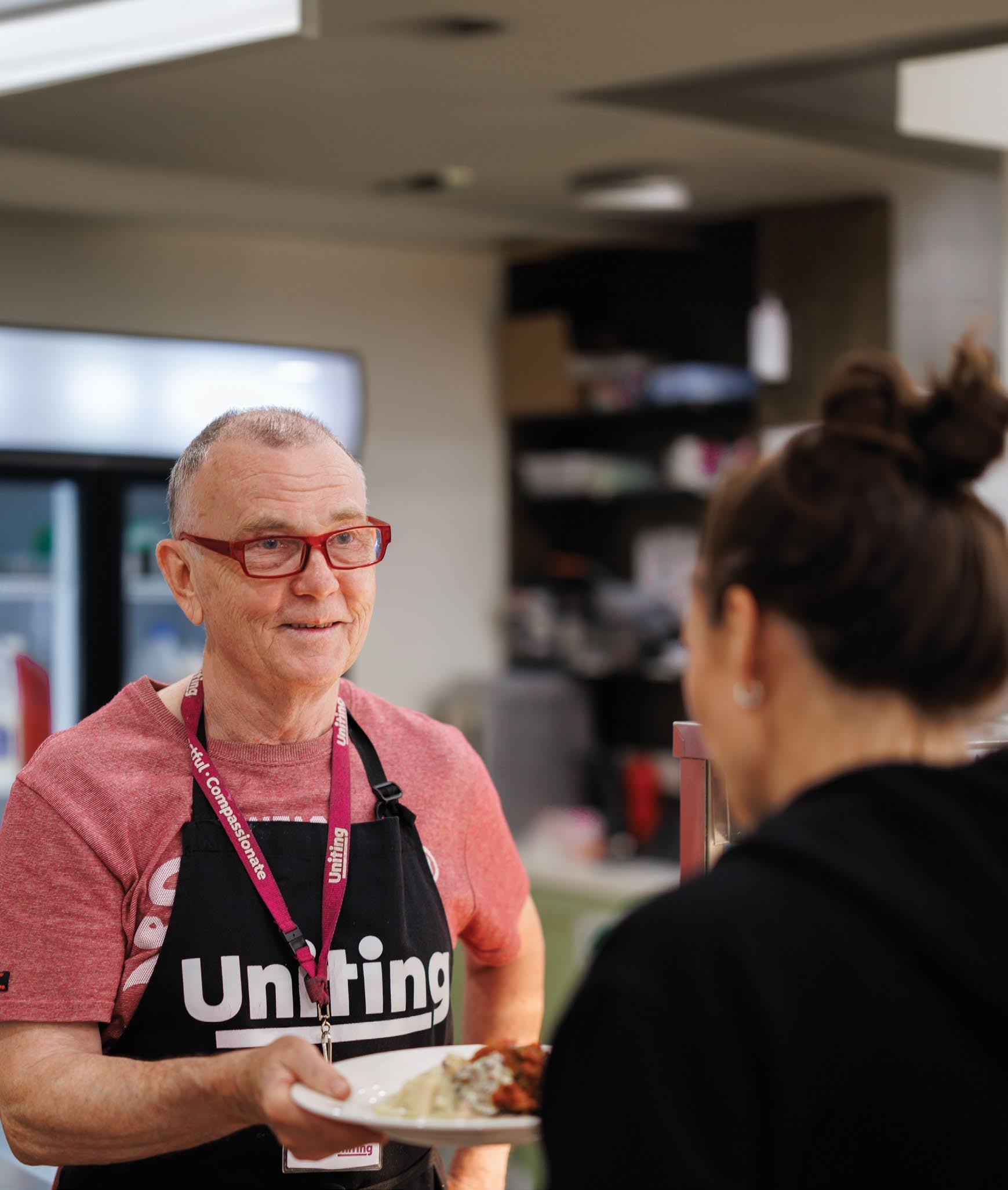
The Covenanting Statement. How far have we come? 30 years on Pages 12-24



The Covenanting Statement. How far have we come? 30 years on Pages 12-24

When the National Assembly meets next month, members will be asked to consider the most significant piece of work carried out on the life and future of the Uniting Church since union in 1977.
On May 10, the National Assembly released ‘Act2: The Gift of the Spirit’, the Act2 report to go before the 17th Assembly, Assembly members and the wider Church.
The final Act2 report in the current phase of the project, includes an integrated set of proposals to be considered across three streams.
The first is focused on a vision for lifegiving communities of faith discipleship and mission, the second on a vision for a network for a flourishing theological culture and education, and the third on a vision for sharing our life and common wealth.
“It follows four years of work which began in March 2020 and included an intensive period of exploration and discernment over the past 18 months,” Act2 Project Lead Andrew Johnson says.
“We affirm that over the past 47 years
of our life, God has been faithful, and there is so much to celebrate.
“We also know that the ways we currently order and go about our life are not working in many places.
“There remains so much more opportunity for a life-giving future if we can find and commit together to pathways forward.”
For each stream there is a vision, a set of principles, key changes and a proposed oversight mechanism.
All the proposals come with the endorsement of both the Act2 Steering Committee and the Assembly Standing Committee, with both having had the opportunity to consider the implications, opportunities and risks of the proposals.
“Alongside these is the risk of doing nothing,” Andrew (pictured right) says.
The proposals include establishing two new national Commissions.
One would be focused on establishing a National Network for Theology, including a national multi-campus theological college.
The other would be focused
on governance, resourcing and administration.
This Commission would also test the feasibility of two options for a governance structure, one with three councils and the other with four councils.
The stream on local communities calls all communities to renew their focus on discipleship and mission, and also includes proposals to renew the toolkit for local governance.
There is a proposal to look again at church membership to align our rules with our reality.
Another proposes that we progress work on our theological understandings of discipleship, evangelism and mission.
“Collectively the three visions offered in the report provide three different windows on our shared identity and life as a Uniting Church,” Andrew says.
“Shaped by the biblical witness, each vision provides fresh framing on life, guided by the Basis of Union.
“The visions and principles also draw on the foundational statements we have made since union.”
The report itself builds on the previous work of the Act2 Project, particularly the interim report released in June 2023, 'Act2: In Response to God’s Call'.
It continues reflection on the diverse and shared identity of the Uniting Church and gives an overview of the workstreams which have shaped the process so far.
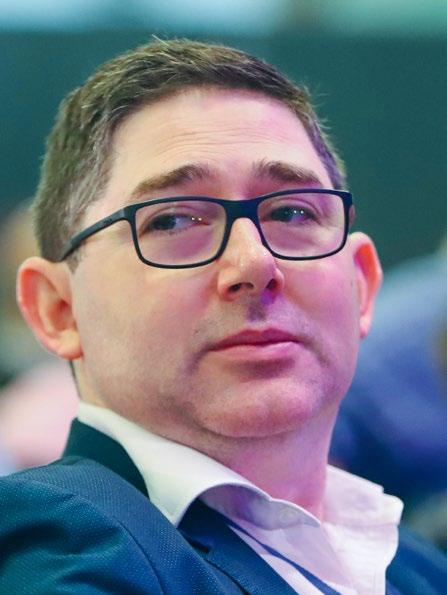
National President and Chair of the Act2 Steering Committee, Rev Sharon Hollis, agrees with Andrew and says the proposals hold a once-in-a-generation opportunity.
“Through this process we have
regularly had to grapple with difficult truths that have emerged from looking closely at the life of the Uniting Church,” Sharon says.
“There is much that people find hard and frustrating as they feel hindered by our current approach.
“The Spirit is calling us in new directions, and this is an opportunity to reorient our life to our very purpose, to serve the Gospel of Jesus Christ and enter more fully into mission.”
Andrew says the Act2 team has continued to be inspired by the challenge posed by inaugural President Rev Dr Davis McCaughey in his sermon at
the Uniting Church inauguration.
“He said that union means nothing unless it drives us back to the fundamental questions of where we come from, where we are going, and who we are,” Andrew says.
“He challenged those gathered on the opportunity to find their bearings afresh in Christ.
“Forty-seven years later, as we contemplate our second act as a Church, we are drawn back to these questions.
“The proposals are offered as the next step as a pilgrim people on the way together.
“We offer them to the 17th Assembly in humility and love for the Uniting Church.”
The Assembly meeting will take place in Parramatta from July 11-16.
The Act2 report can be read alongside other Assembly reports at uniting.church/17thassembly
The Act2 Project Unit will be offering Assembly members opportunities to engage with the report ahead of the meeting, and it can be contacted by email on uca.act2@nat.uca.org.au
A chance conversation brought Edna McCormack to Hadspen Uniting Church and, 42 years later, she is still an important member of the small but vibrant congregation.
Edna and her husband Eric would travel to Launceston to worship as part of a Christian Brethren congregation when they first arrived in Hadspen, before that brief chat with a retired minister brought her to her home town’s Uniting Church.
“One day this retired minister came to me and said, ‘we don’t have an organist at Hadspen, so would you be willing to come and play,” Edna recalls.
“I’m certainly not a professional organist but I thought it would be nice to support my own town’s church.”
Hadspen sits just 10 kilometres from Launceston in Tasmania but, in many respects, its Uniting Church congregation represents the quintessential example of a small faith community that refuses to die.
These faith communities rely on the hard work and dedication of their members and, in the case of Hadspen, it’s Edna who carries a great deal of the heavy load.
Edna can remember a congregation numbering about 40 people at one time, but these days it’s down to about 10 members.
Yet Hadspen continues to punch well above its weight, thanks to members like Edna, who fills the dual roles of treasurer and secretary.
As well as that there is maintenance of the small cemetery behind the church, and looking after the community building next door, to add to the list.
It means a lot of work for Edna and her husband Eric, who has the job of keeping the cemetery grounds in tip-top condition, but Edna says the reward comes in seeing the small church and congregation continuing to contribute to the community.
By Andrew HumphriesAt one time the Hadspen congregation boasted a strong youth group, the reason the community building takes pride of place next to the church on Main Street.
That building has become a hub of activity and hosts many functions and events, as well as a child health centre administered by the Department of Health and Human Services.
“The department pays us rent and that continues to keep us financially viable,” Edna says.
“A playgroup uses the community building every week during the school term, while the Lions Club, hospital auxiliary and gardeners from Entally House also use it regularly.
“It’s a Uniting Church-developed building which gets a lot of use and we’re quite proud about that.
“There is a lot of work involved with it but it’s well worth it and it plays an important role in the community.”
As for the future, Edna admits the Hadspen congregation, like so many others throughout Victoria and Tasmania, is facing the reality that its days might be numbered.
“We’re all getting old and it’s just one of those things,” she says simply.
Edna hopes, though, that all is not lost and that Hadspen’s emergence as a “satellite town” for families with members working in Launceston might prove positive for the congregation.
“We would love to see some families become part of the congregation,” she says.
“We’re a small but engaging congregation, a very supportive one and everyone is very caring.
“Financially we are okay because we receive rent from people using the community building, and we do support organisations like Frontier Services and the Bible Society.
“Congregation members feel any money we have should be used to help others.”
When Edna sits in the church itself, built in 1846 by the Wesleyans, she is conscious of its long history serving the people of Hadspen and surrounding area.
“I think it’s an all-encompassing sort of church which welcomes everybody,” Edna says.
“We have a wonderful minister in Chris Duxbury, who is very supportive of anything we want to do.”
Ask Edna and she will tell you that there is something a bit special about small country congregations like Hadspen and how they can bring a community together.
“It’s about a common interest, of course, and how we all support each other,” she says.
“For example, we have a lot to do with Evandale, which is a small congregation like us, and we have Westbury congregation members here for communion on the first Sunday of each month.”
The small cemetery behind the church offers a window into much of Hadspen’s history, and Edna feels privileged to be responsible for its upkeep.
Thankfully Eric is on hand to carry out the labour involved, which started when they became part of the Hadspen congregation and found the cemetery needed some serious love and care.
“When we started coming to Hadspen church the cemetery was overgrown and there were weeds and trees and bits and pieces everywhere,” Edna recalls.
“We spent a lot of time cleaning it up and getting it into the state it is in now.
“We also talked to local residents and started to do a bit of a history on the cemetery, which wasn’t well known.”
Forty-two years after becoming part of the Hadspen congregation, Edna reflects with pride on the great joy it has brought to her life, and how the congregation’s need for an organist opened such a rewarding door for her.
 Image: Brad Harris
Image: Brad Harris

Rev Ray Outhred describes himself as just an “average bloke”, but this average bloke turned 100 recently, has lived a wonderful and fulfilling life and continues to spread the word of God to everyone he meets.By Marina Williams
At the age of 100, and after eight decades in ministry, Rev Raymond Outhred is enjoying life.
“Oh, it is a good life, and I can’t wait to see what else is in store for me,” he chuckles.
Ray celebrated his milestone March 21 birthday with family and friends in Bendigo and delivered a service at Forest Street Uniting Church a few days later to mark his centenary.
“The church and congregation asked, and I thought ‘if I am still here on the day, why not’,” he says, adding that he hasn’t retired from service, just slowed down.
“My legs are a little slower and make it more difficult for me to get around, but I still have the get up and go inside of me, and I still do a monthly service at Long Gully.”
His enthusiasm for church service

and meeting old and new friends is infectious.
“I just love having a chat, learning a little bit more about someone,” Ray says.
“I think to have a good life you need to be surrounded by people, laugh a lot, have fun, have faith, be willing to help others and enjoy family.”
Pastoral work, community and family have always been integral to the centenarian’s life.
It all stems from faith, Ray says.
“Faith is very important to me,” he says.
“When I was a teenager, I felt the love of God in my heart, and I changed, but I was timid and shy up until then.
“It gave me speech and a bit of courage to speak.
“I trust in God, I talk to him and I pray.
“I find that’s very sustaining and very helpful.
“I don't know what I’d do without faith, it’s been with me through all my life, and that's why I want other people to know it too.
“It’s part of my motivation.”
Motivation and ministry have taken him “three times around Australia” and overseas.
“I just love being in the country,” he says, reflecting on some of his postings to regional areas.
When the Uniting Church formed in 1977, Ray accepted a 12-month exchange to the UK, which offered a “brush” with royalty at a garden party.
“I didn’t meet the Queen personally, but am sure she gave me a little smile,” he grins, eyes twinkling.
There’s been chaplaincy in prisons, psychiatric wards, and service as an honorary probation officer supervising child offenders.
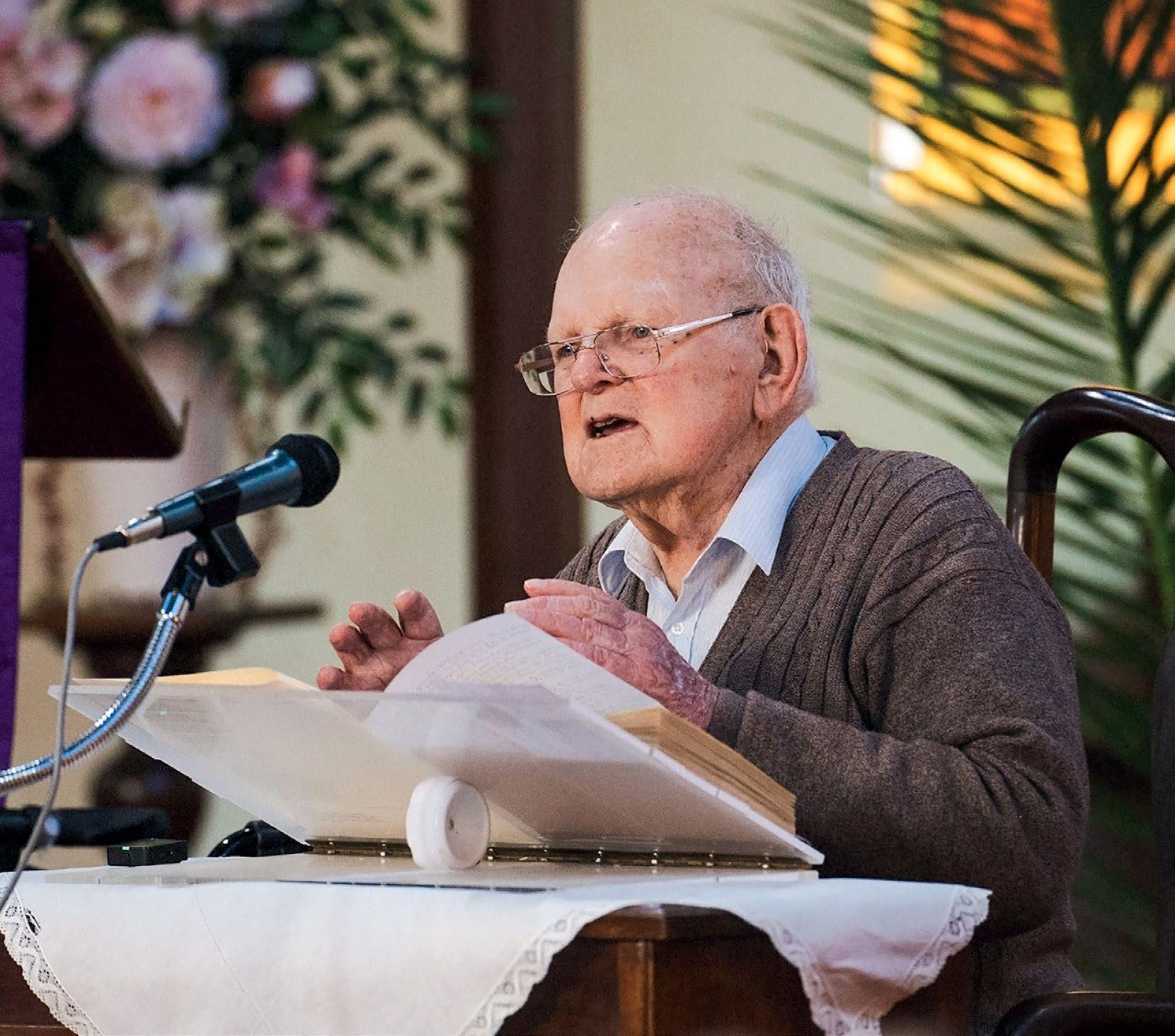
While not in the armed services, Ray was a welfare officer in three army camps, including with Everyman’s Hut, a welfare service that provided support and comfort to soldiers after World War II.
It was when stationed in Papua New Guinea that the former industrial chemist discovered his true passion and calling.
“I had a good job, and good prospects as an industrial chemist, but I always had the feeling that God wanted me to do something else,” Ray says.
wasn’t interested. Later when I was up in New Guinea, I lost my two best mates within two weeks.
“I then thought I should be doing something more useful, so I approached a Salvation Army officer and asked if I could help.
“That’s when people started calling me ‘Rev’ because I was helping and counselling.
counselling, I’m preaching, maybe this is where God wants me to be.”
While still in PNG he wrote to the Methodist Church in Melbourne asking to become a candidate.
On returning to Melbourne a round of interviews followed, along with three bouts of malaria.
“I had to appear for an interview at the North Melbourne Synod of the Methodist Church, but I was in hospital,” Ray recalls.
"When I was a teenager, I felt the love of God in my heart, and I changed."
Rev Ray Outhred
“I was working a lot among children in para-church groups, and I thought it might have been along that line.
“The ministry was suggested, but I
“Then, the padre wanted me to help him, so I did a bit of preaching to the boys.
“I put two and two together – I’m
“They told me that if I didn’t appear I would have to wait another year.
“A nurse came in and told me to get dressed, as an ambulance was waiting.
“I went to my interview in an ambulance, they waited and brought me back to hospital, straight back into bed.

“I was 21 and it worked out well.”
As a young pastor Ray met and married Ivy, who sadly died in 2011.
They have four children: Janette lives in Perth, sons Ian and Robert in Gippsland and retired minister Glenys in Benalla, and the extended family also includes nine grandchildren and 11 great-grandchildren.
“They are all young, in their 60s and 70s,” Ray says with a laugh.
“Ivy and I were the perfect match because she was shy and retiring and hated being the centre of attention, and I was the opposite.
“We were married for 62 years, and sometimes I chat with her every day, just like I talk to myself, too.”
Bendigo became home to the couple in 2006.
“Bendigo has been good to us and it has given us a wonderful community,” Ray says.
“In fact, every place we have been in locum or appointed has given us much joy. I am sure we did about 25 locums –the Church kept asking us, so we’ve been to quite a few places.
“In Bendigo, I will have done just over 380 services, and there’s a few more to come.”
His non-preaching days are spent “pottering around”, reading, doing puzzles and gardening.
“The tomatoes didn’t do as good last year, not much fruit,” he says.
“Hopefully, this year will be better.
“I like looking after myself, doing a bit of cooking.
“I am not very good at anything other than veggies and meat, although I do well with preserves.
“Maybe being an industrial chemist helps in getting the ingredients right.”
Ray feels honoured to have reached 100. He is grateful to have seen how the
world has evolved since he was born in 1924, and what he has been able to achieve in supporting people through the years.
Still, he describes himself as an average bloke.
“Just call me Ray, I don’t walk around with a Bible,” he says.
In continuing his life in service, faith will always be present.
“I'm a bit nervous about the future,” he says.
“Sometimes I think that the world will get worse before it gets better again.
“However, a joyful faith gives you hope every day.
“Every day you commit the day to God and trust him to carry you through.
“There are always difficult times and situations, but you have to bear it.
“You have got to believe in yourself, and with God, I do.”
Uniting volunteers
"Hardship can happen to any of us really. It's just the way life deals it out to you."
Hartley’s Community Meals volunteer Glennie
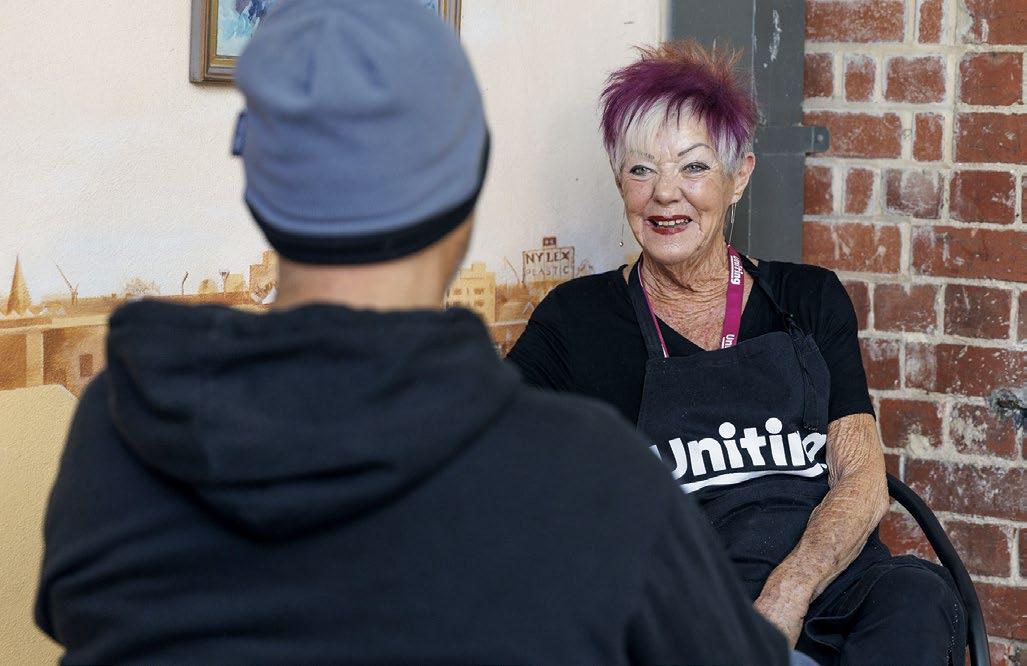
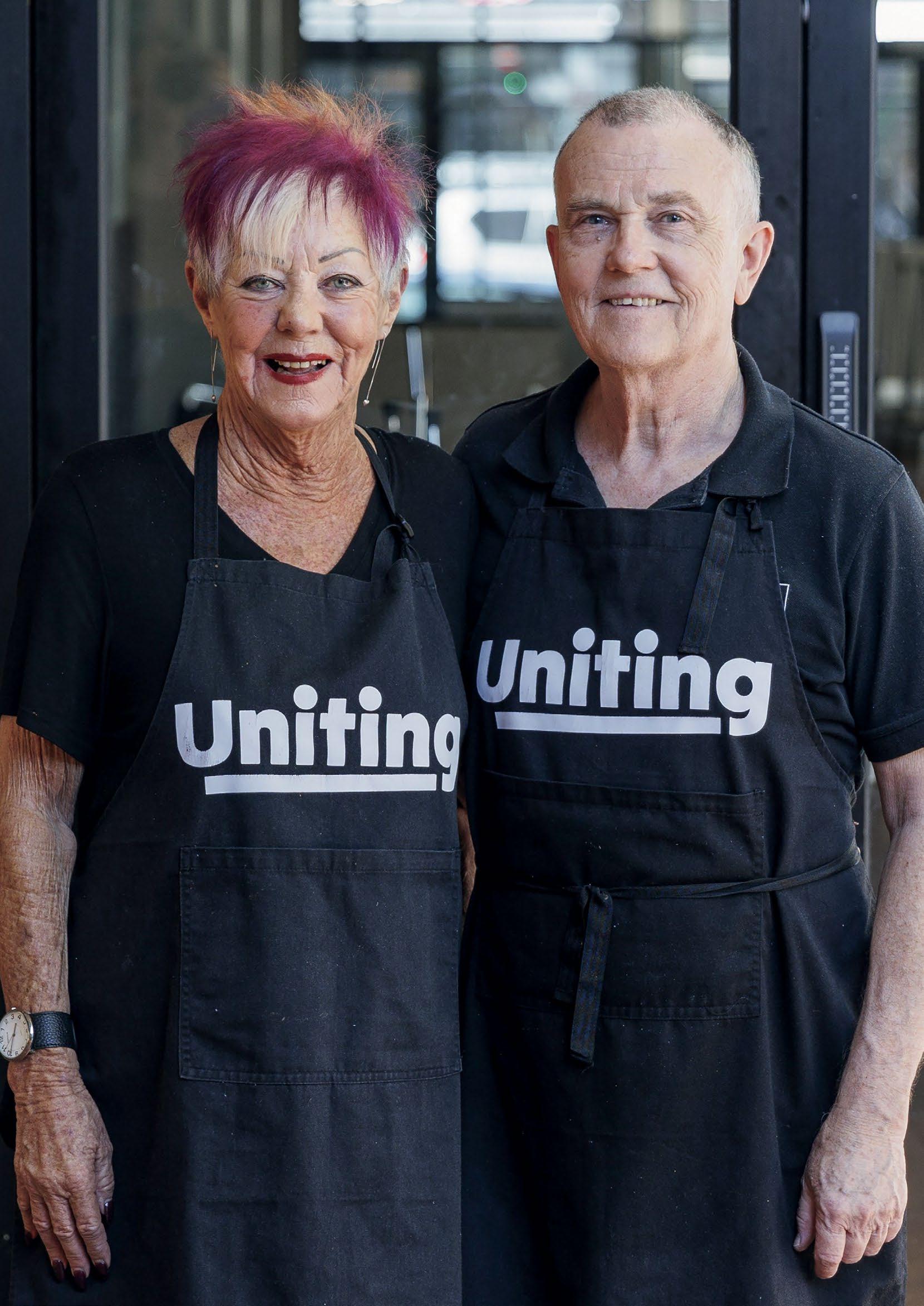 Right: Glennie talks to one of the Hartley’s Community Meals patrons.
Glennie and Jim feel blessed to be able to help out as part of the Hartley’s Community Meals team.
Right: Glennie talks to one of the Hartley’s Community Meals patrons.
Glennie and Jim feel blessed to be able to help out as part of the Hartley’s Community Meals team.
For over 30 years, Hartley’s Community Meals has provided community, connection and a hearty meal to the people of Prahran and surrounds.
Run by Uniting VicTas, Hartley’s was named after its founder, Methodist Minister Rev Frank Hartley who, in 1955, took over as Superintendent of Prahran Mission.
Frank was known for his efforts promoting community-based services, establishing Meals on Wheels, opportunity shops and homes for the aged.
Today, in his memory, Hartley’s Community Meals has become a vital service which provides nutritious lowcost lunches and, during winter, free breakfast to those in need.
Patrons can also collect free takeaway meals, fruit, vegetables, bread and nonperishable foods to take home.
While everyone’s welcome at Hartley’s, most of its patrons are rough sleepers, social housing residents, or those who can’t cook for themselves or can’t afford food due to issues including loss of employment, low income, family violence, increased cost-of-living, and struggles with mental health.
For many in the community the service is much more than just a meal and a chat, it’s also a gateway to other Uniting support services.
Uniting support and mental health duty workers are available at the service to help with referral forms, provide information, and advocate for community members to get the assistance they need.
“We're doing outreach more than we've ever done before,” says Hartley’s team leader, Bryce.
“Many people who come to the service present as homeless. They could be rough sleeping on the streets, they could be staying in their cars, or they might be in between different accommodations.
“We’re also seeing many who are
escaping family violence.” Hartley’s has long offered vital support to the community but the team is now seeing an exponential growth in need.
“We’re seeing a lot of new faces come into the service,” Bryce says.
“Last year we had over 2000 people come through the doors to have a meal with us.”
A service like Hartley’s can’t operate without dedicated volunteers.
One of those wonderful volunteers is Glennie, 81, who has been supporting Hartley’s for over two years, her colourful hair and larger-than-life smile is hard to miss.
Volunteering for the service has given Glennie a new appreciation for what she has.
“When I get home, I open my door and I think how lucky I am, how fortunate,” she says.
“Hardship can happen to any of us really. It's just the way life deals it out to you.
“But nothing gives me more pleasure than to see a smile on their face and hear their laughter, and to know that I’ve brightened their day.”
Another wonderful volunteer is Jim, who in April reached a milestone of 11 years with Hartley’s.
Over the past decade, Jim has seen first-hand the devastating need for the service.
“We probably average about 70 people coming in a day, sometimes even up to 100,” he says.
“People’s situations are getting more and more dire.
“You can see it in the way they carry themselves. They’re hunched over, exhausted.
“You hear people come in and say they haven't eaten for two or three days.”
To combat the worry winter brings to those living on the margins, Hartley’s offers free, hot breakfasts during June, July and August.
For some, this may be the only meal of the day.
Uniting and its volunteers have long been committed to running the meals program, especially as the need continues to grow.
The generous donations of Uniting supporters will mean Hartley’s can offer free breakfasts all year and extend the service’s opening hours so more and more people can get the support they deserve.
“This one lady I met, her rent would take all her money,” Jim says.
“She used to come into Hartley’s wearing the same clothes every day.
“Another gentleman, I don't know how he’s survived, because for the last five or six years he's been living on the street.
“If it wasn’t for Hartley’s I don’t know what a lot of these people would do.”
These people are in need of warmth.
Not just the warmth of a hot meal or woolly jumper, but also the warm embrace of their community.
Glennie and Jim understand that a hot meal and chat can be a lifeline for someone in crisis.
“People out there are suffering,” says Glennie.
“But Hartley’s is just such a magic place and I’m so proud to be a small part of such a great organisation.
“Every little bit we can give them just makes their day, and then they know there's people who care about them,” adds Jim.
Hartley’s is just one of the hundreds of programs Uniting operates across Victoria and Tasmania.
From emergency relief to mental health and homelessness to family violence, their services provide carefully curated, practical assistance to individuals and families in their time of need.
Please help to share the warmth this winter. To donate today, go to www. unitingvictas.org.au/share-appeal
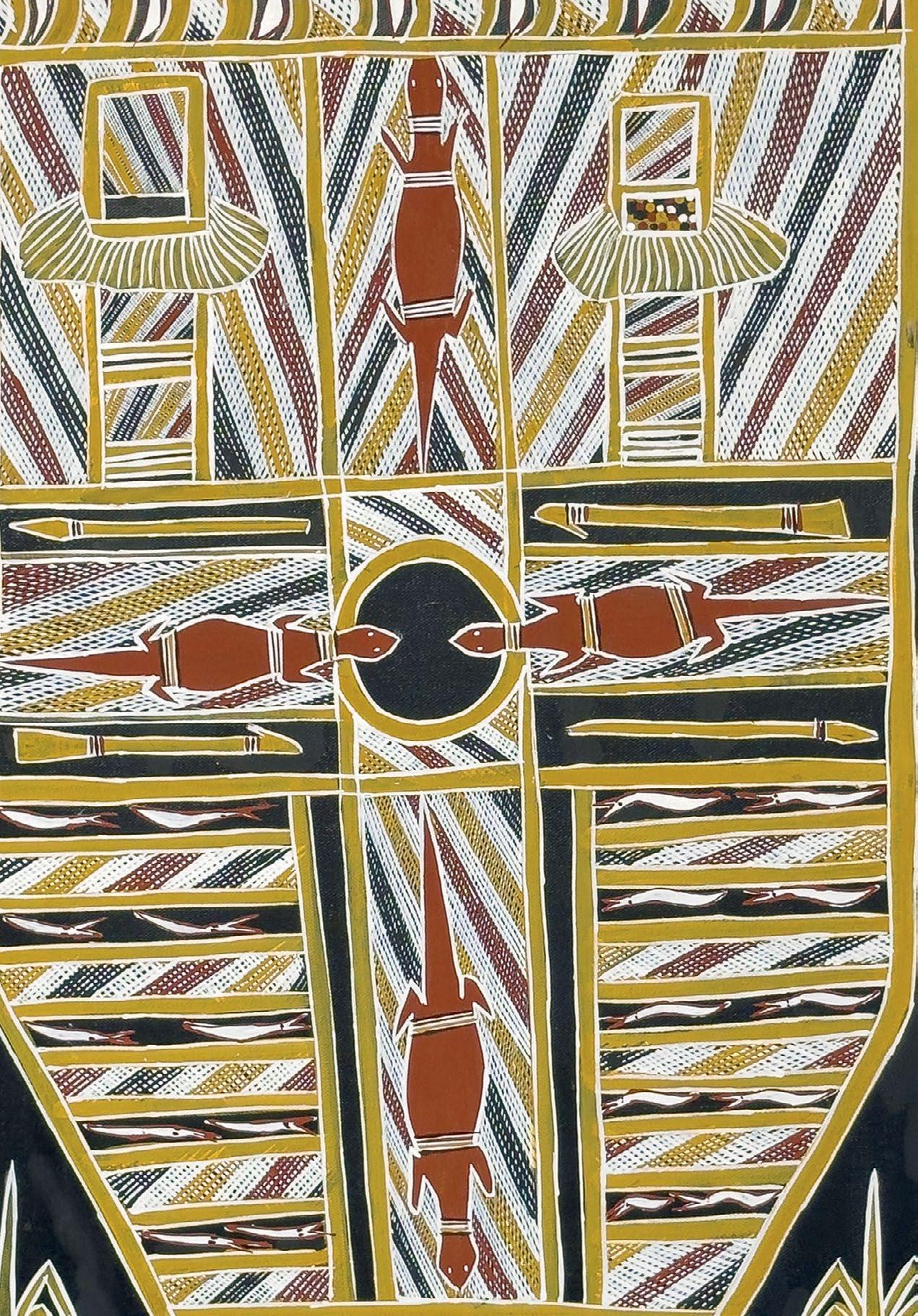

As the 30th anniversary of the Covenanting Statement takes place next month, indigenous and non-indigenous Uniting Church leaders consider what progress has been made since.
By Andrew HumphriesWhenever Jill Tabart enters the Church of All Nations in Carlton, she sees a regular reminder of her role in one of the most significant events in the Uniting Church in Australia’s history.
On July 10, 1994, as the Uniting Church’s first female President, Jill joined Uniting Aboriginal and Islander Christian Congress chairperson Pastor Bill Hollingsworth to sign the document that joined the Assembly of the Uniting Church in Australia and the Congress in a covenant.
Next month will mark the 30th anniversary of that historic day in Sydney and, while it’s an anniversary worth acknowledging, it’s also one that comes loaded with a sense of regret.
Talk to Uniting Church figures like Jill, current President Rev Sharon Hollis, and UAICC leaders Rev Mark Kickett, Alison Overeem and Rev Will Pickett, and they will speak of a sadness that the Covenanting Statement hasn’t been able to achieve more for First Nations People.
A copy of the statement sits near the entrance to the Church of All Nations, where Jill worships, as a constant reminder of that momentous day 30 years ago.
“From time to time at CAN we refer to it and encourage people to take note of what it is saying, and to be challenged by it,” she says.
When Jill recalls July 10, 1994, it is the lead-up to the signing of the statement,

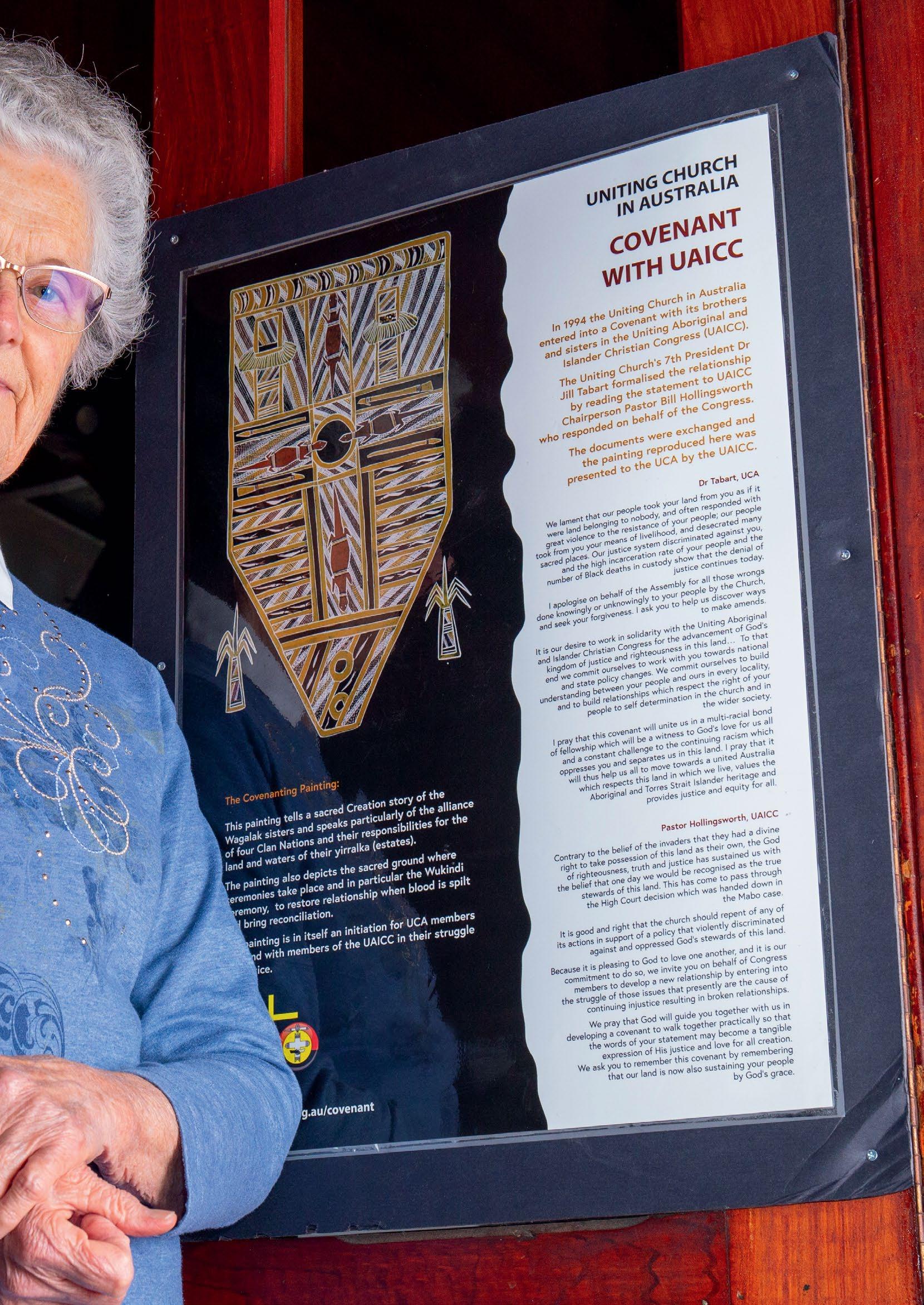 Dr Jill Tabart at the Church of All Nations in Carlton with a copy of the Covenanting Statement.
Image: Carl Rainer
Dr Jill Tabart at the Church of All Nations in Carlton with a copy of the Covenanting Statement.
Image: Carl Rainer
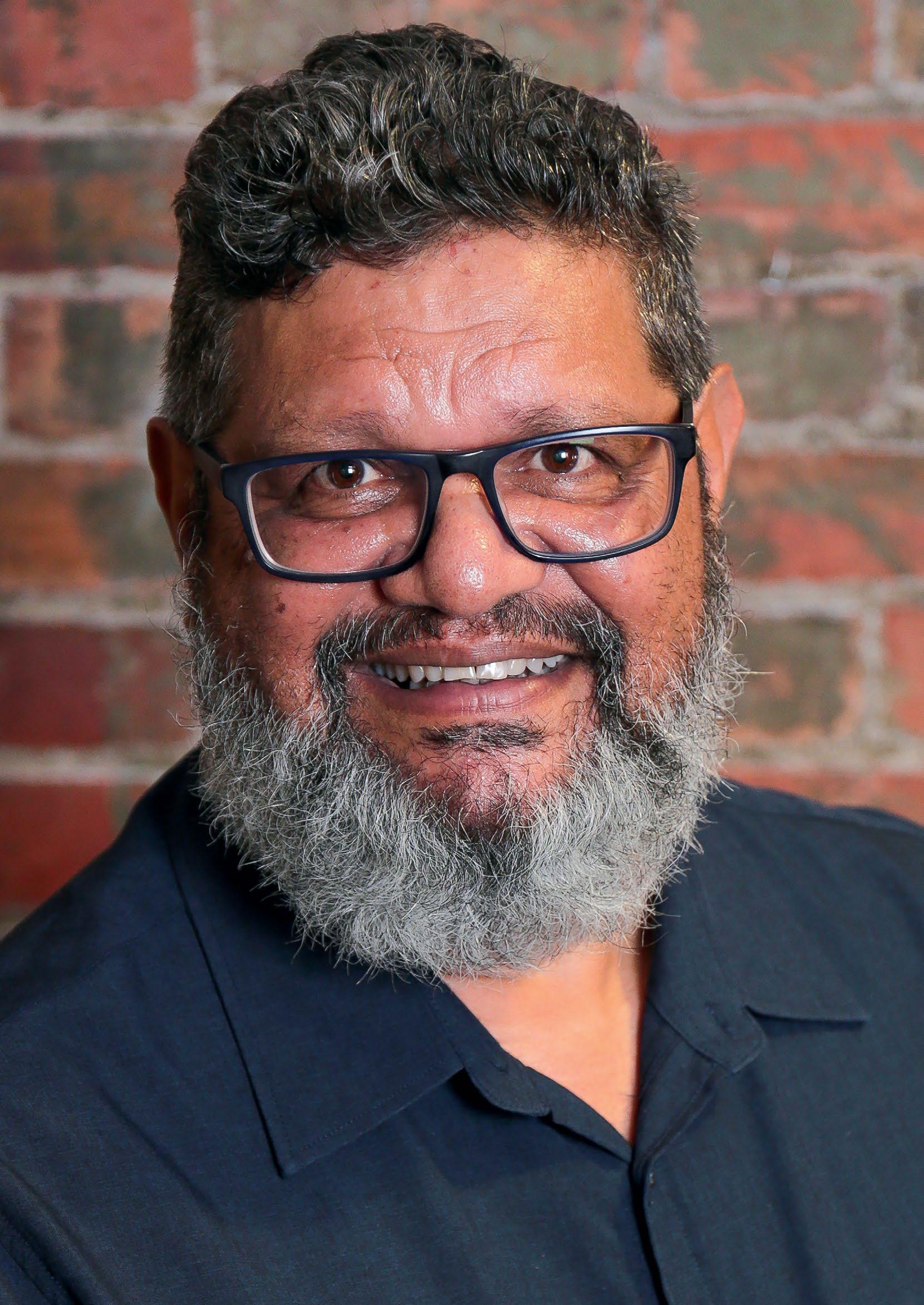 “The UAICC must be the gem that sits in the centre of the Uniting Church’s crown”, says UAICC National Chairperson Rev Mark Kickett.
Image: Carl Rainer
“The UAICC must be the gem that sits in the centre of the Uniting Church’s crown”, says UAICC National Chairperson Rev Mark Kickett.
Image: Carl Rainer
and everything that went on behind the scenes, that she remembers most.
“There was a huge amount of work involved leading up to it, a lot of preparation, and lots of drafts and redrafts of the statement taking place,” she recalls.
“There was much consultation because it was recognised that it was such a significant step that we were taking.
“We were all determined that the statement be comprehensive, but also be right and acceptable and properly express what needed to be expressed.
“We were always going to express lament and regret, but what strikes me most about it now, 30 years later, was the strong commitment it showed, and there were three elements to that.
“We wanted the Church (both First and Second Peoples members) to work together towards awareness-raising truth-telling resulting in national and state policy changes, to increase understanding between First and Second Peoples in every locality, and to build relationships which respected the right of First Nations People towards selfdetermination in the Church and wider society.”
General Secretary within the Synod of Victoria and Tasmania in August.
Like Jill, Sharon will mark the momentous commitment made by the Uniting Church on that day in 1994, but is also saddened that it hasn’t gone on to achieve as much as it could have.
But that regret also extends to the nation as a whole, she says, less than a year after the invitation to recognise First Peoples through a Voice in our Constitution was roundly rejected.
“It's a significant milestone that for 30 years as a Church we've been trying to be in a relationship with Congress that attempts to be a truth-telling relationship, an honest relationship, and a relationship that addresses both the past and the present impacts of colonisation in ways that might help to enable us to be a more whole Church, a more truthful Church, and a Church
As a proud Noongar man from Western Australia, and UAICC National Chairperson, Mark acknowledges the good intentions behind the Covenanting Statement, but admits any celebration to mark the 30th anniversary will be muted at best.
“It’s a significant milestone, and the UAICC does acknowledge that,” he says.
“It brings a sense of joy around the theme of the whole Church standing together in unison and that the UAICC is not a blight or a curse on the landscape of the Uniting Church.
“But the UAICC must be the gem that sits in the centre of the Uniting Church’s crown, and we have to find ways and means to ensure that happens.
“We need that continual groundswell of support that rallies people together to say that for us to be the Church that we want to be, let’s celebrate the First Nations People who are a part of it and take us into a new relationship journey.”
"(The Covenanting Statement) brings a sense of joy around the theme of the whole Church standing together in unison."
UAICC National Chairperson Rev Mark Kickett
capable of walking together on the basis of that,” Sharon says.
“But for me there is a deep sense of lament at the lack of progress made, both within our Church and our nation.
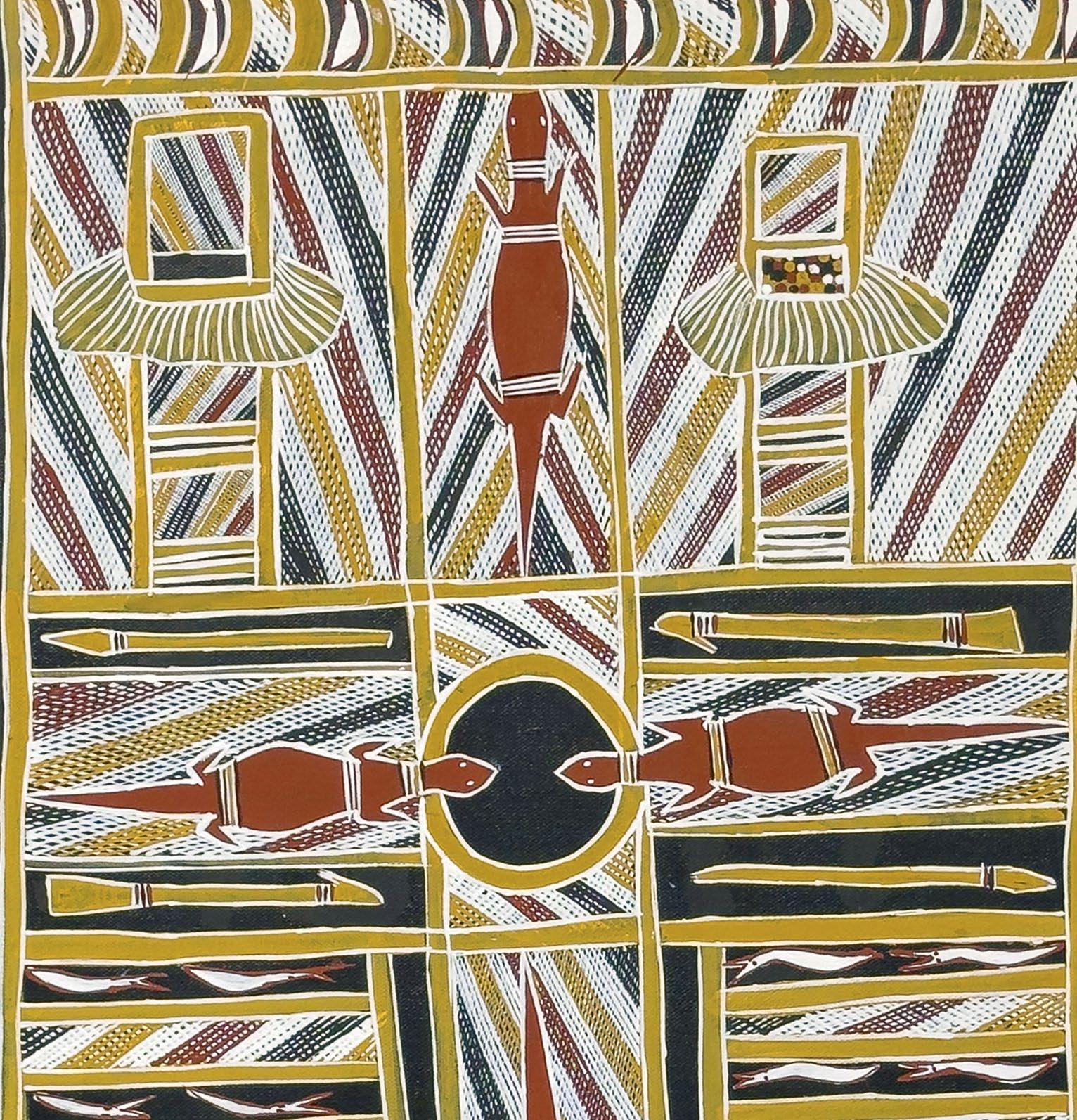
Yet it’s at this point in our conversation that Jill pauses and then says with a deep sense of regret, “but we’ve failed haven’t we?”
“Little things have happened along the way, of course, but I would be ashamed if I thought we could do a tick, tick, tick on it because, overall, I think we’ve barely scratched the surface on the commitment we made that day,” she says.
“There is a deep sense of lament around that and, while I can’t speak for the Church now, I sense that we have lost the urgency around this that we felt in 1994.”
The 30th anniversary next month will occur at the end of current President Rev Sharon Hollis’s term, before she steps down to assume the role of Associate
“At the reconvened Assembly in May 2022 we renewed the covenant and it was a stark reminder that much of what we were lamenting 30 years ago we’ve really not moved the dial on.”
Uniting Church indigenous leaders Mark, Alison and Will know exactly how little the dial has moved in the right direction when it comes to the plight of our First Peoples.
All of them can speak to a lived experience of what it’s like to be an indigenous person in modern-day Australia, and the hurt and heartache that come with that.
They will pause on July 10 and give thanks for the commitment made by the Uniting Church 30 years ago, in the knowledge, though, that so much more must be done.
Tasmania’s UAICC Leprena manager Alison’s 30th anniversary acknowledgement will be tempered by a sense of great disappointment that the Covenanting Statement has not lived up to what was hoped 30 years ago, and is not more widely embraced by Uniting Church members.
“It’s possible to go to one congregation which is living out the Covenant at a local level, but then go to another congregation which doesn’t even recognise it,” she says.
“It seems to me that the Covenant is something well supported at an Assembly level, and Synod management level, but the question is, ‘how does it filter down to congregational and church council life?’.
“Step one for people within the Church is to be aware that there is a Covenant, step two is to ensure that people appreciate what that Covenant means, and step three is to ensure they are immersed within its life.
“If we’re a Church that is committed to covenanting, how do we resource the
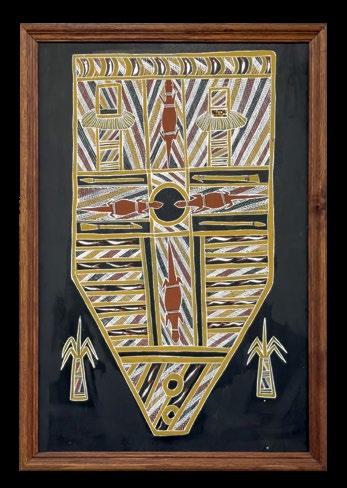
Excerpts from the Covenanting Statement delivered by Uniting Church President Dr Jill Tabart on July 10, 1994
Long before my people came to this land your people were here. You were nurtured by your traditions, by the land, and by the Mystery that surrounds us all and binds all creation together.
My people did not hear you when you shared your understanding and your Dreaming. In our zeal to share with you the Good News of Jesus Christ, we were closed to your spirituality and your wisdom.
In recent years we non-Aboriginal members of the Uniting Church in Australia have had the privilege of journeying with the Uniting Aboriginal and Islander Christian Congress and with other Aboriginal people. We have become more aware of the sad impact that in earlier times the church and our culture had on your people.
We lament that our people took your land from you as if it were land belonging to nobody, and often responded with great violence to the resistance of your people; our people took from you your means of livelihood, and desecrated many sacred places.
Our justice system discriminated against you, and the high incarceration rate of your people and the number of Black deaths in custody show that the
denial of justice continues today.
Your people were prevented from caring for this land as you believe God required of you, and our failure to care for the land appropriately has brought many problems for all of us. We regret that our churches cooperated with governments in implementing racist and paternalistic policies.
By providing foster homes for Aboriginal children, our churches in reality lent their support to the government practice of taking children from their mothers and families, causing great suffering and loss of cultural identity.
Our churches cooperated with governments in moving people away from their land and resettling them in other places without their agreement.
I apologise on behalf of the Assembly for all those wrongs done knowingly or unknowingly to your people by the Church and seek your forgiveness. I ask you to help us discover ways to make amends.
Excerpts from the response to the Covenanting Statement from Uniting Aboriginal and Islander Christian Congress (UAICC) Chairperson, Pastor Bill Hollingsworth
For many thousands of years Aboriginal people moved in harmony with creation and subdued it as necessary by hunting, fishing and

gathering, thus respecting God's command and allowing the earth to sustain us. Our laws were developed by our relationship with the land and our intricate system of inter-tribal government. Trade was established which has never been acknowledged or understood appropriately by European researchers. In 1788 this relation with creation was violently disrupted by the invasion of the European, which robbed us of our stewardship of the land which God gave to us.
Your ancestors came to us in different ways and we saw little of our caring God in them. They did not come to us as God's will would dictate, but to dispossess us, take our children, rape our women, kill our men and boys and destroy our culture, reject our values and beliefs and ultimately claim our lands as their own. As a direct result of this violent dispossession, Aboriginal and

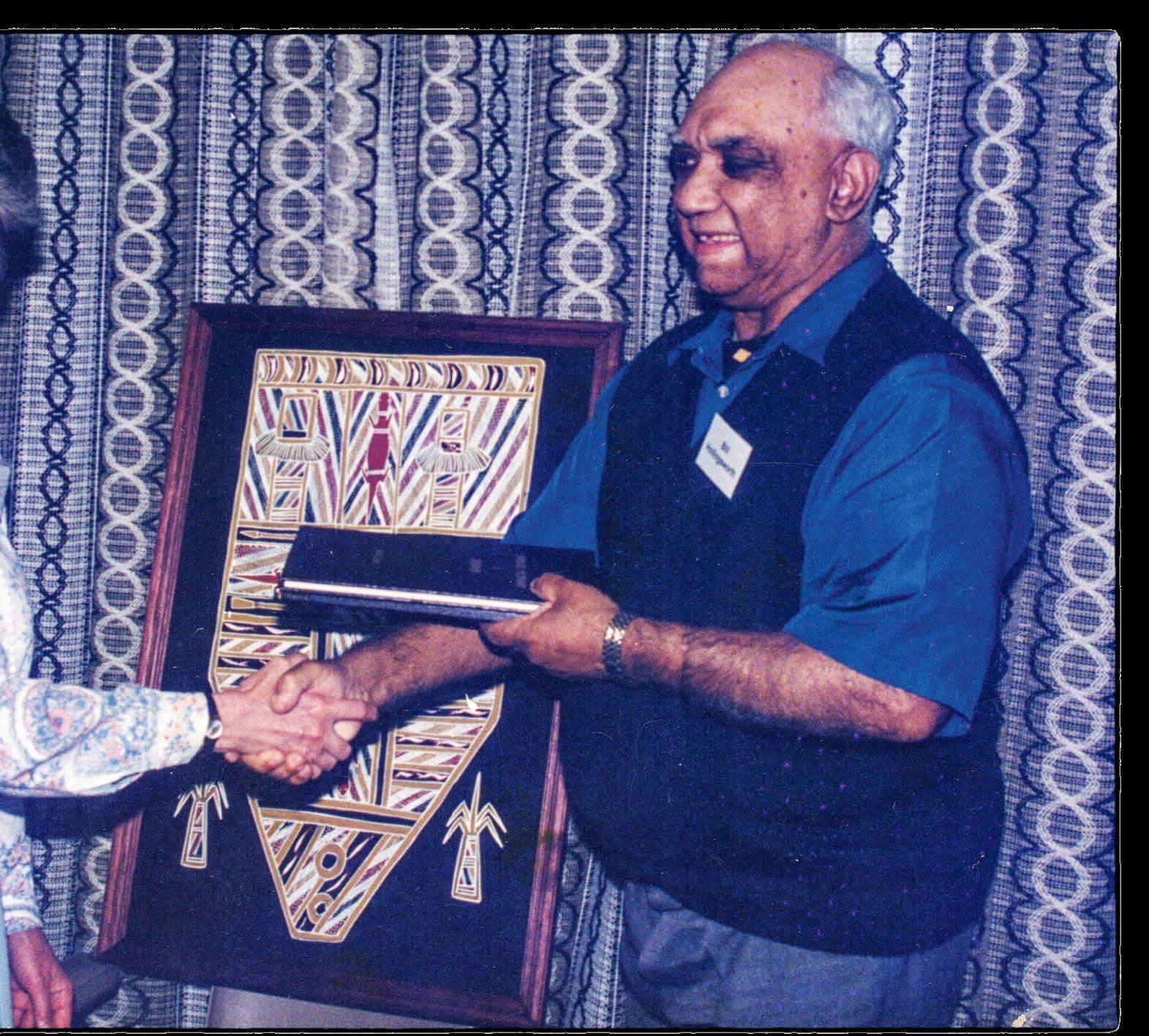
Torres Strait Islander people have lived as strangers and outcasts in their own land.
We agree with you that the church, which had a responsibility to be the conscience of the invaders, in many instances relinquished this responsibility and joined with the invaders in a great many atrocities by smoothing the pillow for what was believed to be a dying race.
Along with the past governments of Australia, the church is held accountable in our society for the injustices/atrocities inflicted on our people.
As a result of the violent dispossession and resulting isolation from economic empowerment in Australia, within a great number of our people there has developed a deep anger and resentment of European people.
Therefore it would be wrong to just say "I forgive", without reaching a commitment to

Dr Jill Tabart and Pastor Bill Hollingsworth mark the Covenanting Statement on July 10, 1994.
work together to lay a new foundation upon which we may build a more just future together by ensuring that the Uniting Church plays an active role in providing adequate resources to address the present disadvantages caused by the past injustices and dispossession by the invasion of this country.
We come to this covenanting table with our gifts of Aboriginal spirituality, our culture, our Aboriginal way of loving and caring, our instinctive concern and a willingness to share and teach our history and every good aspect about being Aboriginal and Islander.
Our commitment to walk together with you as equals will be measured by our willingness to share with you our friendship and our love for God's creation.
The full statements from Dr Jill
Tabart and Pastor Bill Hollingsworth can be found at www.uniting.church/ the-covenanting-statement/ Preamble to the Constitution
In 2009 the Assembly of the UCA passed a resolution to revise the Preamble to the Constitution, acknowledging: Aboriginal and Islander peoples as the First Peoples of Australia; the tragic colonial history of injustice, violence and dispossession of First Peoples and the Church’s complicity in this history; the First Peoples had already encountered the Creator God before the arrival of the colonisers; the Spirit was already in the land revealing God to the people through law, custom and ceremony.
The Preamble to the Constitution can be found at www.ucaassembly. recollect.net.au/nodes/view/137

As the sounds of a noisy pub filtered up from downstairs, Aboriginal clapsticks rang loud in the room where we gathered.
In this way our speaker, Brooke Prentis, a Wakka Wakka woman from Queensland acknowledged the Wurundjeri people of the Kulin Nation, the traditional custodians of the country on which we gathered.
The event at the Clyde Hotel in Carlton hosted by the new Wesley Centre for Theology, Ethics, and Public Policy was ’Theology on Tap’, an informal gathering of people who like to talk about theology and how it shapes our communal lives.
Brooke is a nationally recognised Aboriginal Christian leader as well as a writer, theologian, chartered accountant, company director, and poet.
“My theological journey started when I became a Christian at the age of 21 in the Salvation Army,” Brooke says.
Eventually she became a pastor, and attended the very first Grasstree Gathering, a network of Aboriginal Christian leaders from across the country convened by Auntie Jean Phillips, one of Australia’s most respected senior Aboriginal Christian leaders.
There were 50 attendees at the first Grasstree Gathering, and now the network is 200 strong.
Brooke says that first Grasstree Gathering meeting changed her life.
It also made her question some things about the church.
“I had been a Christian for 10 years (but) why had I not met any other Aboriginal Christian leaders?” she asked.
“For 10 years I had incorrectly assumed that my people were not Christian.”
This is a mistake still made today.
In schools, Brooke says, usually

Christianity is extracted out of units on Aboriginal spirituality. Yet the 2016 Census showed 54 per cent of Aboriginal and Torres Strait Islander people identify as Christian, a much higher rate than the general population.
“Christianity is actually part of our Aboriginal spirituality,” Brooke says.
Brooke unpacked the term ‘Aboriginal spirituality’, noting it can be used in problematic ways that demonstrates a lack of understanding.
“It’s our culture,” she says.
“It’s a whole system of law and living which includes the legal, political, social, physical, environmental, ecological, economic, and spiritual.
“Pre-colonisation, all these were in harmony. When you strip out Aboriginal spirituality as a separate thing, you are missing the fact that it’s one aspect of our whole system of law and living.”
Brooke also shared what it’s like to be an Aboriginal Christian leader in Australia today. First, there is the physical and emotional toll.
“The funerals we’re doing; trying to keep kids with their families; trying to keep our mob out of jail; putting food on the table, that’s what Aboriginal Christian leaders are doing every day,” Brooke says.
Then there is the difficulty of being heard by the rest of the church at all
“Some churches say, we won’t have you come to speak as an Aboriginal Christian leader because that’s about politics and the church isn’t about politics,” she says.
“But we have seen 250 years of injustice in these lands now called Australia.
“If the church doesn’t have something to say into that there’s something wrong.
“Until we face what has happened to
By Rev Robyn WhitakerAboriginal people in these lands, nothing else can flourish.”
The response, she says, does not just lie with Aboriginal people.
“We need people to walk alongside us,” Brooke says.
“Often people are still letting us be the ones who have to address the racism.
“We need non-indigenous people to be calling it out, in the church especially.
“When it comes to working with Aboriginal people, it’s secular Australia that is far more involved, far more interested and actually in relationship, than Christians in Australia.
“We have a spiritual issue to deal with (and) there is a spiritual blindness and a spiritual deafness.
“That’s why we need a Christian voice in the public space, like what the Wesley Centre will be able to bring, to speak into that spiritual issue.”
This call to speak out against racism and for justice is to the whole church.
The Wesley Centre hopes to be part of such a voice and to amplify the voices of Aboriginal Christian leaders such as Brooke.
“We need good public theology in Australia (and) I want to see the normalising of theology in the public space,” she says.
“We need Christian voices in the media who speak up for justice and display the non-discriminate love of Jesus.”
Find out more about ‘Theology on Tap’ at www.thewesleycentre.org
Find out more about Brooke Prentis’s ministry at www. brookeprentis.com
Robyn Whitaker is Director of The Wesley Centre for Theology, Ethics, and Public Policy and Associate Professor of New Testament at Pilgrim Theological College

Brooke Prentis has emerged as one of the country’s most respected indigenous Christian leaders.

“The Uniting Church began a journey 30 years ago based on recognising and listening to First Nations People,” Will says.
“In that sense we’re on a good path, but there is much more needed.
“I think we need to educate members, at a Presbytery and congregational level, about the Covenanting Statement and retell the story around it and what it can achieve.
“There is a sense of sadness that more hasn’t been done, while I remain hopeful the statement can be more widely embraced.
“It’s going to be a better journey if more people come along with us on it.
“My wish is that First and Second Peoples can join together on this
Second
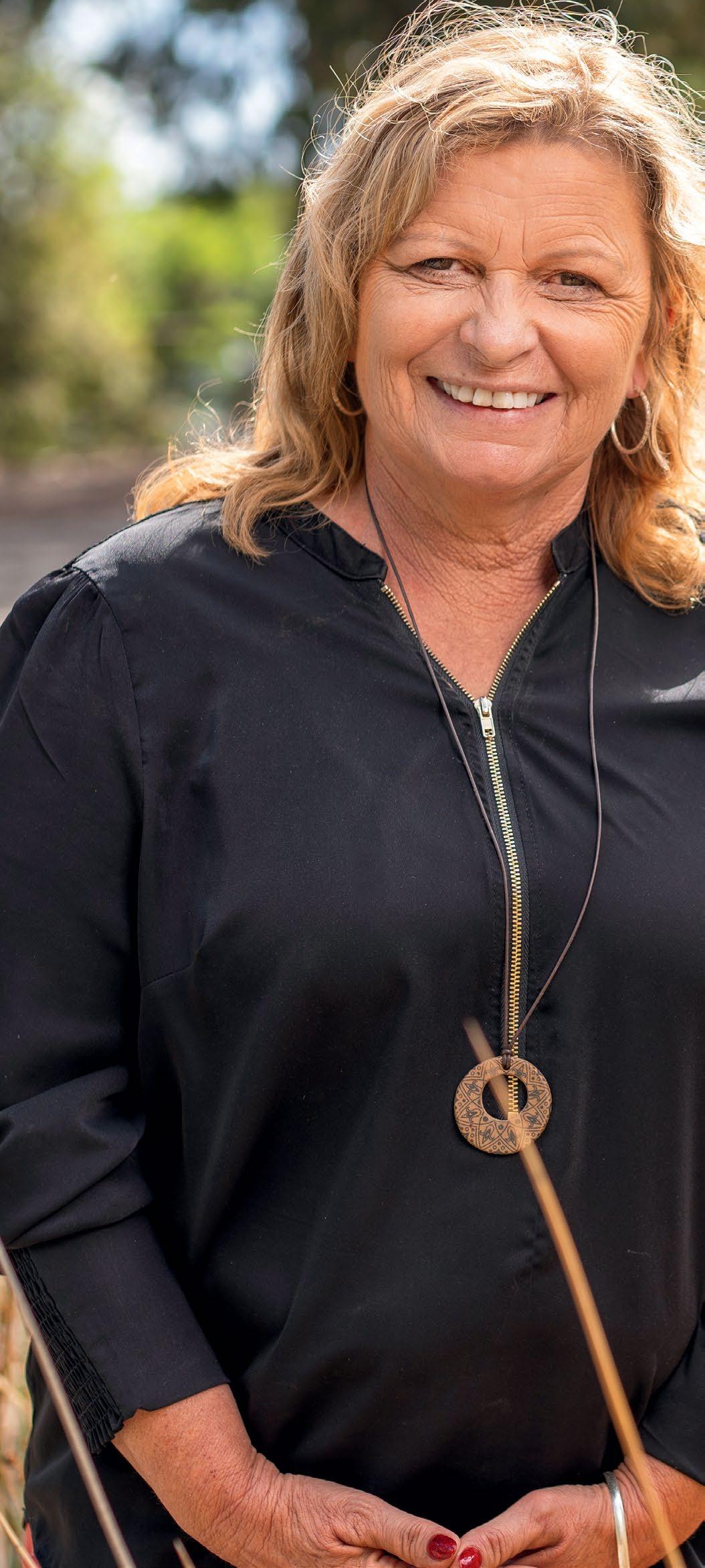

covenanting journey, and engage together on a level that represents more than just tokenism.”
Mark says any discussion around the Covenanting Statement must take into account the deep injustices suffered by First Nations Peoples since colonisation.
Central to that injustice, he says, was the theft of their land.
“It’s important to look at it in terms of how the Covenanting Statement has made our lives better, and how it changed our lives in terms of our relationship with Christ, but also the relationship with our First Peoples,” Mark says.
“Central to that is the sense of injustice around the Church’s wealth being built on stolen land.
form of truth-telling, she says.
“There is still this wound at the heart of who we are as a nation that has not healed.
“I hope the Covenant is an enduring reminder that we can engage in honest truth-telling and that there is freedom and liberation in that.
“For me personally it brings a moment of deep pause and a sense of gratitude for the Covenant, and the people who did the work on it, but also deep lament that we are still not living the Covenant as a Church.
“If we want to move forward as a nation we have to address this issue, and I have always seen it as part of my duty as President to remind the Church about the Covenant in a way that continues
"If we’re a Church that is committed to covenanting, how do we resource the work needed to make it happen?"
UAICC Leprena Manager Alison Overeem
“It’s (about acknowledging) the violence and the bloodshed and disconnect, and everything that has come after that.”
On that theme, it is Pastor Bill Hollingsworth’s response that day in 1994 that Jill often reflects on.
“The most powerful words that day came in Uncle Bill’s response,” she says.
“He wasn’t saying, ‘yes, we forgive you and thank you for saying all of those things’, he was actually challenging us.
“In fact, at the time he said that it would be very hard to forgive what had been done to First Nations People.
“The statement, then, was not an achievement in itself - it could only signal our commitment to engage in ongoing changes towards making amends. And the challenge continues.”
While there has been progress around the edges, Sharon says it’s issues like Aboriginal deaths in custody, youth incarceration, the gap in life expectancy and lack of economic opportunities for First Nations People that have not been addressed.
Addressing them must come in the
it.”
How the Uniting Church embodies the Covenant in its own life brings to the table a number of important questions which must be considered, says Sharon.
“When we talk about mission, what does it mean for the mission of this congregation, community, Presbytery, Synod and Assembly that we have a Covenant? How do we support the ongoing life of Congress to be selfdetermining and sustainable?” she asks.
“What does it mean when we make decisions about things like property, and ministry placements?
“How do we constantly ask ourselves ‘are we living up to the Covenant that we’ve made?’.
“The Covenant is about a relationship between First and Second Peoples, so how can congregations develop relationships with indigenous people in their area and get to know their stories of country?
“It’s about congregations having conversations about paying the rent, and having more than just a plaque around the stories of the people whose land

With courage, grace, humility and hope, may we hear God’s call to walking together faithfully towards the future that God invites.
I am writing this article the day before travelling to Bendigo for a regional meeting of the Walking Together in Covenant Committee.
We’re travelling there as part of a program of visits around Victoria and Tasmania to encourage local membership of the Uniting Aboriginal and Islander Christian Congress (all First Nations members of the Uniting Church are automatically Congress members), and to encourage efforts towards covenanting and relationship building.
God gives us a vision of the reconciliation and renewal which is the end in view for all creation.
Congress has helped the Church to begin unpacking what reconciliation and renewal means in these lands where, as we recognise in the Preamble, God’s love and ways were being revealed before the arrival of the colonists.
in the injustices. Injustices have been perpetuated through generations.
As a church, we acknowledge that we are beneficiaries of the dispossession of land from First Peoples.
Preparing for Yoorrook allowed for a review of the history of the missions of the churches prior to the formation of the Uniting Church; and for a review of our engagement with First Peoples and with advocacy for justice, voice, truth and treaty.
The Synod has provided a substantial submission in response to a series of particular questions by the Commission, which is likely to be published on the Yoorrook website.
 Reverend David Fotheringham Moderator Vic
Reverend David Fotheringham Moderator Vic
I have had the uncomfortable privilege of being a witness at a Yoorrook Justice Commission hearing on behalf of the Uniting Church.
The Commission has the powers of a Royal Commission, and was established to investigate injustice against First Peoples in Victoria since colonisation.
The Commission is focused on truthtelling.
It aims to establish an official record of the impact of colonisation on First Peoples in Victoria, and to develop a shared understanding of that impact as well as of the diversity, strength and resilience of First People’s cultures.
It was a privilege to be a witness before the Commission because this is an historic moment for Victoria, and an important step in the recognition of the history of these lands, waters and people.
It was also rightly uncomfortable, because colonisation was brutal, and churches came with the colonisers.
While there were good intentions and efforts, church leaders often shared in paternalism, racism, and complicity
Yoorrook has also encouraged us to encourage others to make submissions too, which can add to the stories of how colonisation has impacted First Peoples; the strength and resilience of First Peoples; and the survival of cultures, knowledge and traditions.
Local stories from congregations or families are welcome, and submissions can be made until November.
Yoorrook, which is First Peoplesled, will make findings and recommendations towards a more just future for First Peoples before it concludes in mid-2025.
In the meantime we continue with relationship building, learning, and working towards a more just future. Through Yoorrook’s website, or by other research, please know something of the history of the land on which we are now found, and heed the request from the Congress to offer an Acknowledgement of Country when we meet together.
In following Christ we are called to be people of reconciliation.
With courage, grace, humility and hope, may we hear God’s call to walking together faithfully towards the future that God invites.
National President Rev Sharon Hollis says the Uniting Church must take its lead from the UAICC moving forward. Image: Carl Rainer

it still is. For me, that’s how we move forward, in finding those opportunities in our own context. The Assembly is encouraging the Church through its ‘Living the Covenant Locally’ movement to grow those relationships and understanding.
“It would be wonderful to see more engagement with this resource in honour of the anniversary.
“Given the Church’s commitment to selfdetermination and sovereignty, we have to take our lead from the UAICC and what they seek, whether it’s truth telling or treaty, and what sort of political process they would like us to engage with them on.”
Uniting Church is this covenanting relationship with First Peoples that recognises we’re on stolen land,” she says.
“It’s not enough anymore just to recognise that fact with plaques, and maybe I’m actually encouraged by that because I think there are enough people
walk into the Uniting Church can have an understanding of why we do things like a welcome to country and an acknowledgement of First Peoples.
“We need to transform the statement into something that captures the imagination of everybody, like it did when it was written 30 years ago.”
"I believe we have enough good champions out there to be celebrating a 60th anniversary in 30 years’ time."
UAICC Leprena Manager Alison Overeem
within the Uniting Church with a fire in their belly around this.”
The concept of “paying the rent” is one Mark says must be addressed if the Covenanting Statement is to have any meaning at all.
Alison says the truth around the land being stolen from First Peoples must be at the forefront of any conversation.
“What must sit at the heart of the
Like any document, the Covenanting Statement needs to be regularly examined, says Mark.
“The big issue is that we need to revisit the Covenanting Statement, and the Preamble to the Constitution, to see if it’s still relevant to all of us,” he says.
“If it’s no longer relevant we then need to ask the question, ‘how do we make it relevant?’, so that people who
As the Uniting Church prepares to mark next month’s anniversary, Alison offers some words of hope as she pictures a time when the Covenanting Statement has been more widely embraced within the Church.
“When I first started with the Uniting Church, my answer would have been ‘no, it’s all too hard’,” she says.
“But now I see so many pockets of good, I really do.
“I believe we have enough good champions out there to be celebrating a 60th anniversary in 30 years’ time.
“We’ve got some work to do as the Uniting Church, but what we need to hold on to is the hope that sits in the great stories that are already there.”
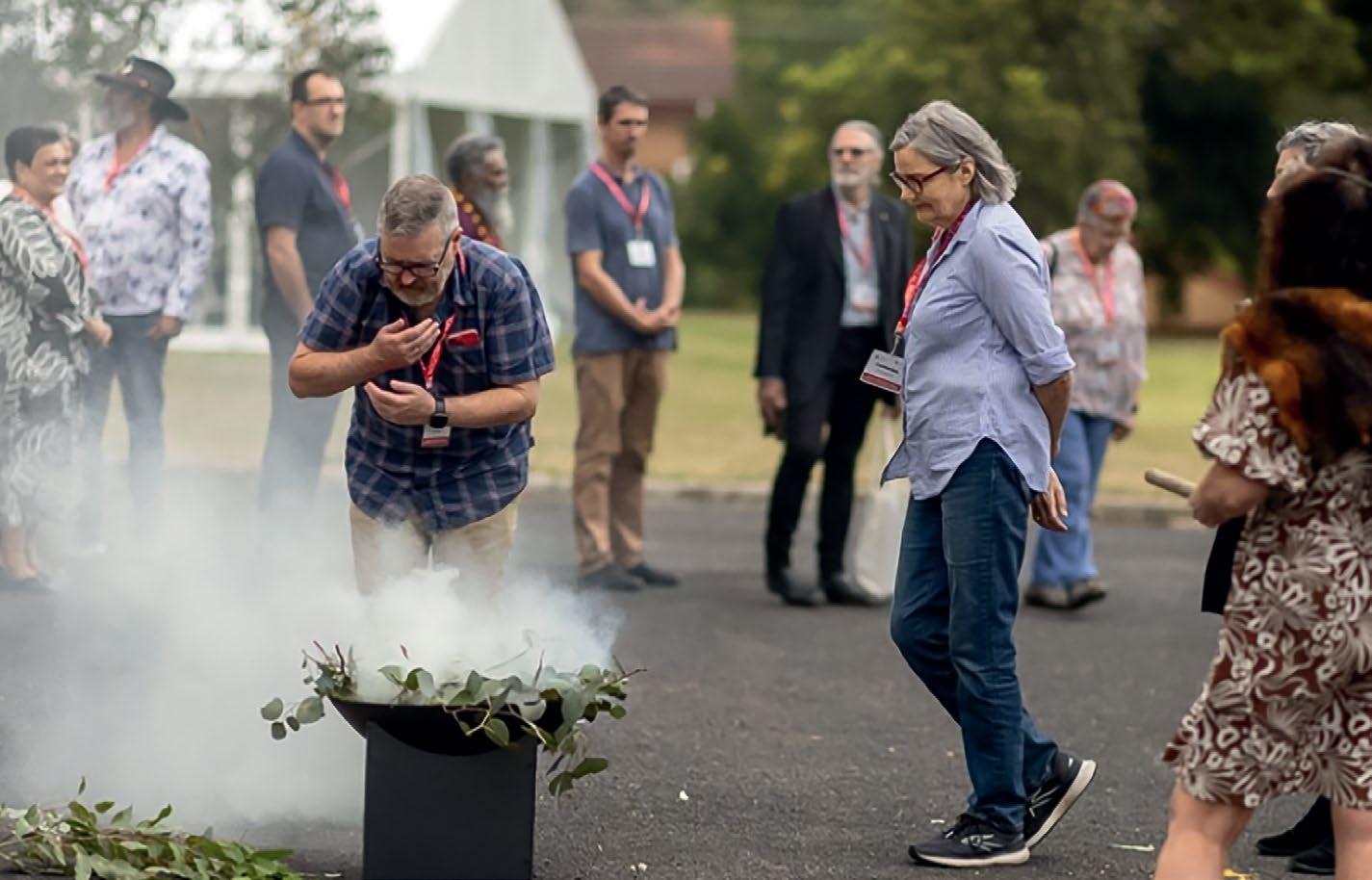
In February this year, an historic gathering of indigenous church leaders and theologians came together in Melbourne on a national platform.
The ‘Raising Our Tribal Voice for Justice: An Indigenous Theological Revolution’ conference at the University of Divinity's School of Indigenous Studies aimed to explore indigenous theological perspectives on spirituality, colonisation, justice, repatriation, Country, and ecology, particularly in response to the 'Voice to Parliament' referendum outcome.
With a focus on truth, reparations, treaty, justice, and reconciliation, the event facilitated meaningful discussions among indigenous theologians and delegates from various denominations.
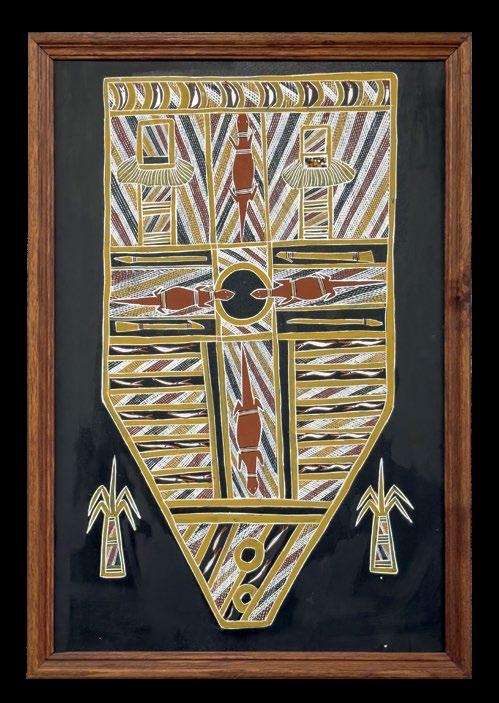
The conference garnered significant attention, drawing a diverse audience and high praise for its organisation and impact.
The aim was to delve into critical issues facing indigenous communities in Australia, New Zealand, and the Pacific.
The conference aimed to amplify indigenous voices within theological discourse, foster dialogue on justice and reconciliation, and showcase the theological diversity inherent in indigenous theology.
It offered an opportunity for indigenous people to engage with theology through their cultural lens, affirming their identity and heritage.
Furthermore, the event underscored the significance of indigenous
theology in addressing historical injustices, fostering reconciliation, and transforming the Australian nation.
The feedback from delegates highlighted the positive impact of the conference, with a strong commitment to continuing the conversation on indigenous theology through future symposiums.
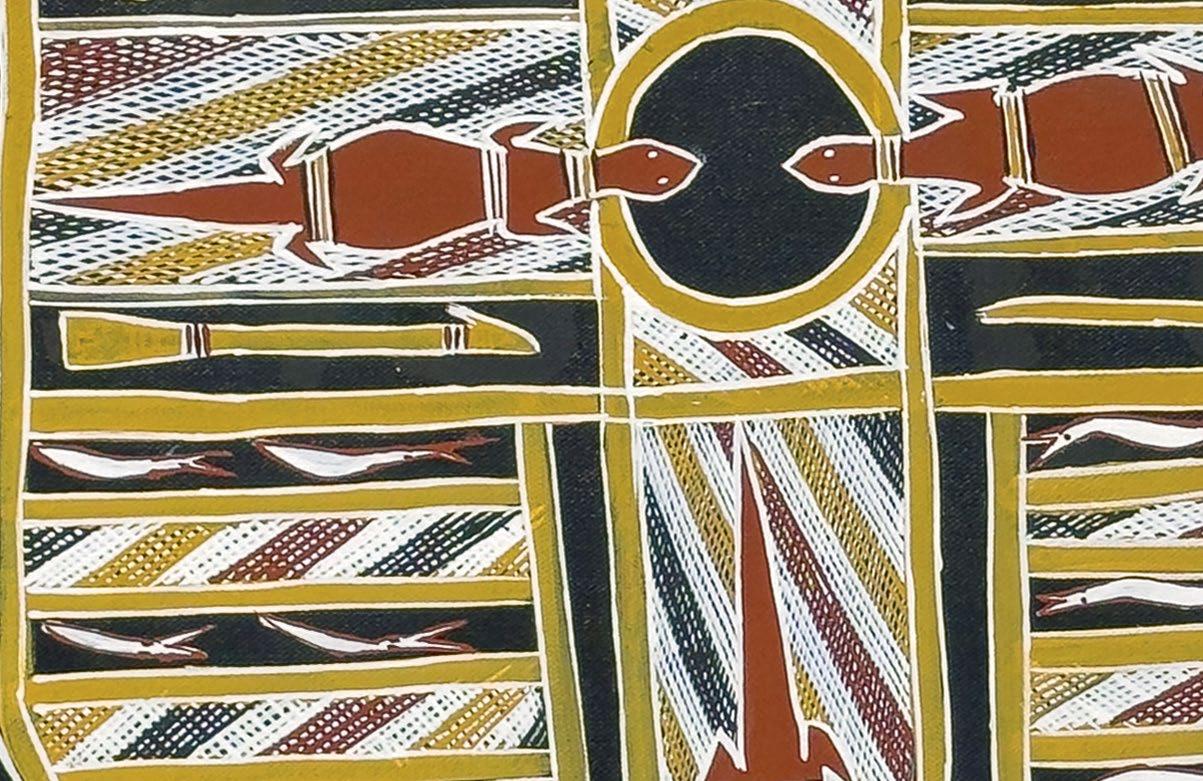
The daily discussion groups of truth, reparations, treaty, justice and reconciliation were incorporated to foster meaningful engagement and discussion by conference participants.
Generally positive comments were received from delegates speaking to their overall experience.
The conference was a resounding success, thanks in large part to the support of sponsors.
By providing funding for this transformative event, they contributed to advancing indigenous theological discourse, promoting justice and reconciliation, and empowering indigenous communities.
The conference not only highlighted the importance of indigenous voices within theological conversations, but also paved the way for future collaborations and initiatives in this critical area.
Anne Pattel-Gray is Professor of Indigenous Studies and Head of the School of Indigenous Studies at the University of Divinity.
 By Jacqui Simpson
By Jacqui Simpson
Have you ever travelled through the outback, or seen those vast sprawling maps, and got a sense of the incredibly vast distances out there?
The far horizons and sweeping plains are what make the outback so special, but it’s also what makes everything so much harder for those who live there.
Any help can be a long, long way away.
Elaine’s* property was a 400km round trip from the nearest town.
She didn’t mind as she’s a fiercely independent woman fully capable of running her 200,000-acre property, even after the sudden death of her husband.
But then came dementia, and Parkinson’s.
The vast distances made everything so much harder.
Elaine had to leave her beloved property and the life and business she and her husband had built for 40 years.
The nearest aged care facility was 200km away, where she knew no one.
People in the bush bear the same burdens as all of us: illness, death, heartbreak, and despair. But they have to bear it with no one around, and hardly any support services.
How would she sell her property? How would she organise the hugely
complex paperwork involved in moving into aged care? How on earth could she sort through 40 years of memories and decide which mementos to leave behind?
Thanks to the generosity of wonderful supporters, Frontier Services bush chaplains can travel across the outback to bring practical and pastoral care to anyone in need.
They are there for people in whatever way is required.
Some need a chat and shoulder to lean on. Others need prayer and hope. Others, like Elaine, need active practical support: sorting through belongings and filling in forms to move to an aged care home.
Elaine’s bush chaplain was there by her side as she sold her farm, her business, her cattle, and everything she’d worked hard for.
The bush chaplain was there to hold Elaine’s hand and drive her around as she packed up her life in the farm.
Each visit involved a 400km round trip from Elaine’s property to the nursing home.
On an average day, a Frontier Services bush chaplain can travel anywhere from 20km around town to meet with
emergency services teams or local elders to over 600km round trips to teach children and engage youth through music.
But it’s still not enough.
Bush chaplains say that they simply can’t meet the increasing need and can’t cover enough kilometres in a day.
It breaks their heart, but sometimes, they have to tell someone asking for their help, “I’m sorry, but I can’t be there for you right now”.
Frontier Services, formerly the Australian Inland Mission, is an agency of the Uniting Church.
Through the generosity of supporters, Frontier Services bush chaplains can live and travel in the bush to provide practical, pastoral, and spiritual support to people doing it tough on the land.
A gift of $20 can help continue Rev John Flynn’s legacy of providing a ‘mantle of safety’ to people living in rural and remote parts of Australia.
Learn more about Frontier Services at www.frontierservices.org
* Name changed to protect privacy

For 150 years Scoresby Uniting Church has witnessed much change in a neighbourhood that has evolved from a fledgling rural township founded in the 1870s to a busy outer Melbourne suburb.
On April 14, the history of the church, and the enduring faith of its community, was celebrated with a special mass and anniversary events that included a communal meal within the sun-dappled church grounds.
Church secretary Lillian Brown says Scoresby Uniting Church has been pivotal in shaping lives, and providing support and guidance to people through the years.
“Many of our members have decades of attachment to the church, including my family, and we have more recent ones, and it was wonderful to see so many people attend the celebrations,” Lillian says.
“We were especially happy to have had a beautiful sunny day, as it meant we could take the celebratory meal outside and share with the wider community, many of whom would not have come through the church doors.
“The celebrations were about people and community.”
Records state that the church opened as the Scoresby Wesleyan Church on April 5, 1874, officially becoming part of the Uniting Church in 1977.
“It is the oldest continually used building in the City of Knox in
By Marina WilliamsMelbourne’s southeast,” Lillian says.
“Many shops have been built around the church grounds, resulting in our location in the heart of Scoresby village.
“The church has always been there, having the same purpose.
“On the outside, it is pretty much what it was when built and, in 1977, the stained-glass window over the arched door was changed to incorporate the Uniting Church symbol.”
The church is constructed from clay dug from what is now a recreation reserve.
“Scoresby was a rural area of farms and orchards, and to build the church clay was dug from nearby, transported by horse-drawn dray to the Oakleigh Brickworks, fired into bricks and then taken back to Scoresby,” Lillian says.
“It was completed in time for Easter service.
“To this day, the site of the church on the busy north-east corner of Stud and Ferntree Gully roads remains central in the community.”
Plans for the church began when orchardist William Horner and his family moved to Scoresby in 1866.
For many years they worshipped at the Black Flat Wesleyan Church in Glen Waverley.
“Reverend J. B. Smith, the Brighton Circuit minister, was known to the Horner family and offered to conduct services at Scoresby,” Lillian says.
“These started in the Horner home and later moved to the Scoresby State School after it opened in 1872.”
That same year permission was given to build the church, with a half-acre of land opposite the Horner home purchased for £6/5/-. Construction cost £265.
“Clay provided the foundations for the building, but the church is built on family and community,” Lillian says.
“It has brought (our family) conversation, community, and home, which we have enjoyed and valued to this day.”
Attending the celebrations were “members from years past who no longer live in Melbourne”, local and federal government representatives, members from cluster churches and “children and grandchildren from members who have passed on”.
Michele Berton, a member of the Scoresby congregation, coordinated and led the service, which opened with a Welcome to Country.
Fellow members delivered a history of the church, a faith journey and Bible readings, and sang in the choir.
The church’s only fulltime minister, Rev John Bottomley (from 1974-1982), delivered the sermon.
“During John's ministry, the congregation was challenged on social justice issues and the role of the church in modern society, topics that continue
 Secretary Lillian Brown is proud of the contribution Scoresby Uniting Church has made to the wider community.
Image: Carl Rainer
Secretary Lillian Brown is proud of the contribution Scoresby Uniting Church has made to the wider community.
Image: Carl Rainer
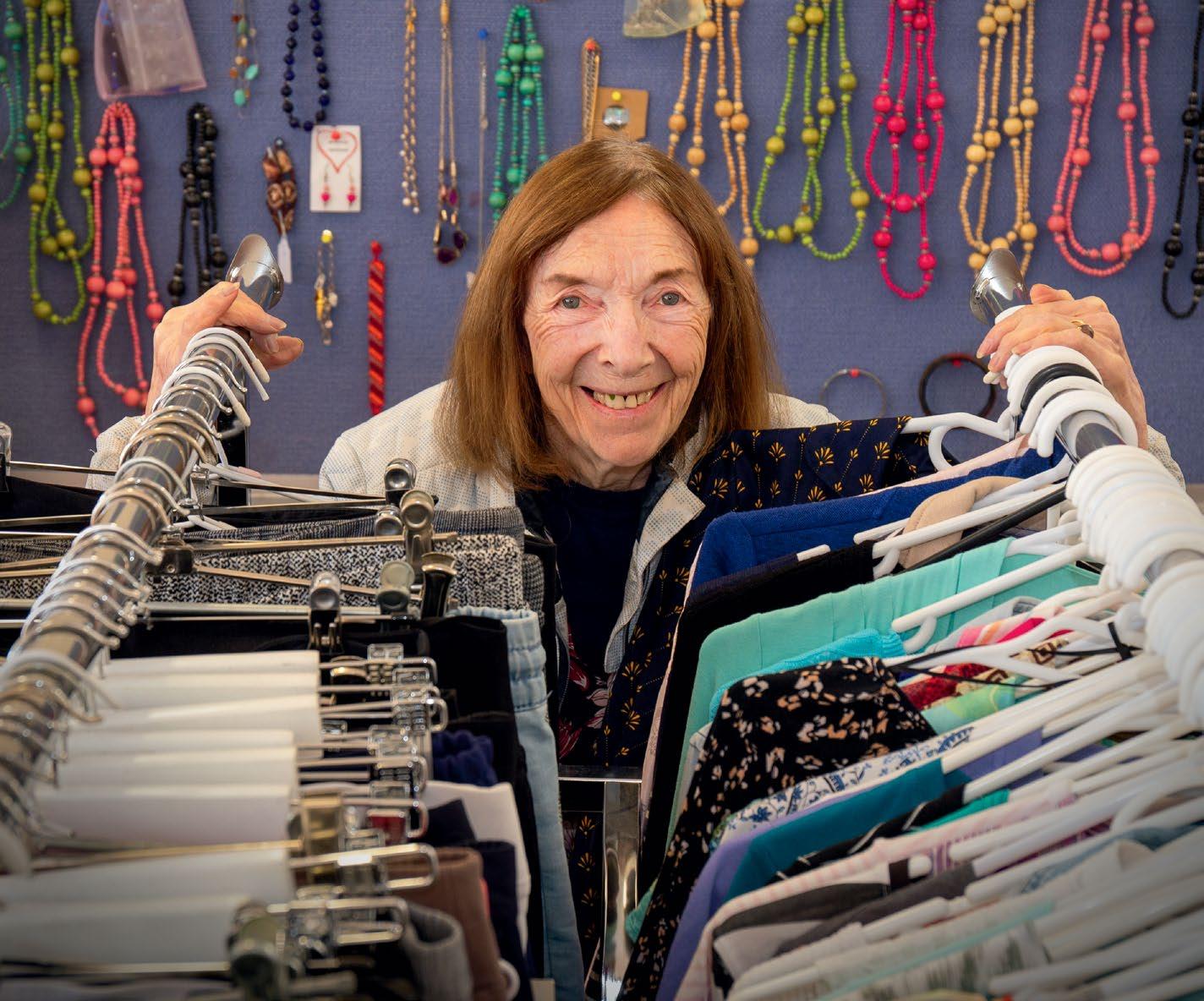
to challenge us today,” Lillian says.
A particularly poignant part of the day, Lillian says, was hearing from an elder from the Wurundjeri Woi Wurrung Cultural Heritage Aboriginal Corporation.
“He spoke about his people’s journey on looking after the land on which the church stands,” she says.
“He said he hoped that one day Aboriginal and white people will be able to walk forward on an equal footing to care for Australia together. It was very moving.”
– Bayswater, Boronia Road, Ferntree Gully and Rowville. Even with just 23 members today we continue to serve in our community,” Lillian says.
“Services continue twice a month with the support of a shared ministry team, visiting speakers, and the active involvement of the congregation.”
“It’s about taking the church to the people,” Lillian says. We have tried, unsuccessfully, opening the church and removing anything that might strike the public as ‘churchy’ and inviting people to take time out of their busy day to think and meditate.”
The drop-in centre is run with the support of volunteers from across the cluster.
"Many of our members have decades of attachment to the church and it was wonderful to see so many people attend the celebrations."
Church secretary Lillian Brown
Lillian says that although membership has fluctuated over the years (records show membership was eight people in 1872, growing to 60 families in 1988), Scoresby is proud to have offered continuous service to Christian faith, all while adapting to cultural and social change.
Today it is part of the Knox Uniting Church Cluster, formed with the four other Uniting Churches in the region
Community programs delivered over the years include an opportunity shop (which closed during COVID-19), emergency relief support, and a drop-in centre.
“When people find their faith or need support, we are here for them, but it is a challenge to bring people in.”
On some Sundays a ‘café church’ is held in the adjacent hall, not in the church.
“People can pop in for a cup of coffee and a chat, borrow a book or even buy some second-hand clothing,” Lillian says.
“We have not been overrun with people dropping in, but there is always someone.”
She says the congregation remains hopeful about the church’s future.
“COVID has changed how people interact, and I think people remain wary of being physically close to others,” Lillian says.
“Our congregation is just normal people having a good time, and we want to continue to share that with others.”
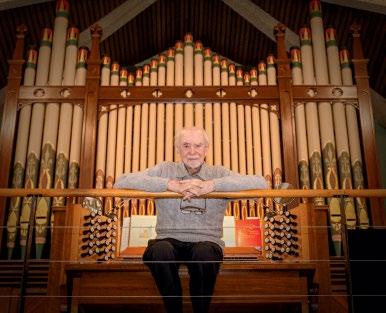
In 1984 Bruce Steele was invited to become organist at what was then St Aidan’s Uniting Church in North Balwyn.
Forty years later, Bruce, who is 92, is still playing at Sunday services, weddings, and funerals and still experiences the joy in the sound of the organ that he discovered 87 years ago.
Bruce first remembers hearing the organ in 1937, when he was five years old, and his pianist mother took him to a recital at the Melbourne Town Hall.
The thrill of the huge sound was a revelation.
Bruce begged his father for organ lessons, and one Sunday his father took him to see the organist at the Independent Church.
The man looked at the six-year-old and, to Bruce’s chagrin, said, “his legs are too short, keep him at the piano”.
It wasn’t until Bruce was in his first year at university that his local church acquired an organ and the local organist gave him permission to teach himself on it.
Bruce’s start at St Aidan’s in 1984 came when organist Douglas Lawrence, who
By Rev Avril Hannah-Joneswas about to become Director of Music at Scots Church in Melbourne, wanted to hand St Aidan’s over to someone of whom he approved.
Bruce was eventually persuaded to take on the role and, on April 21, North Balwyn Uniting celebrated his 40th anniversary as Director of Music, and everyone is so glad that Douglas prevailed.
When Bruce arrived, the St Aidan’s congregation decided to find an organ that would better suit the beautiful building and found one through the South Island Organ Company of New Zealand.
The congregation’s music society raised the necessary money through concerts, stalls, car boot sales, and art exhibitions, helped by a loan from the Synod.
Once the loan was paid off the Synod firmly told the congregation that in future it would not permit a church to spend $400,000 on an organ.
As a member of a university English department, and editor of works by D. H. Lawrence and Henry Handel Richardson,
Bruce has always been fascinated by words as well as music.
With the support of Rev Dr Lorraine Parkinson, he created settings for all 150 of the Psalms, to be sung responsively by cantor and congregation.
When Lorraine took a group from St Aidan’s to Temple Beth Israel for a musical afternoon and Bruce’s version of Psalm 69 was sung, the Jewish audience was astonished, never having heard such a thing.
Bruce has also written his own hymns, including a ‘Hymn for the Aging’, which he wrote as a joke, but which is popular with the North Balwyn congregation.
Bruce says of music that it can be a better vehicle for meaning than words.
“To recite a creed, for instance, is like checking out the items on a menu,” he says.
“We can argue about their meanings, and The Nicene Creed is a good example.
“To hear it in Bach’s B Minor Mass is to have such a revelation of the divine that the words alone can scarcely suggest.”
Rev Avril Hannah-Jones is minister at North Balwyn Uniting Church.
Warrnambool Uniting Church minister Rev Malcolm Frazer reckons there could be a pretty good book written about the history of the church in the region.
If so, any book’s author would need to devote a substantial amount of space to capturing the strong missional commitment of its members to the local community, and beyond.
Church members continually live out the ethos of the Faithful Giving concept, regularly digging deep to provide financial support for both church and non-church programs.
Warrnambool Uniting Church is part of the Hopkins region in the Presbytery of Western Victoria, along with the Port Fairy, Allansford and District, and Mortlake congregations.
Malcolm has had the great honour and privilege of being one of their ministers and is witness to their numerous displays of Faithful Giving.
In fact, the words “faithful giving” hardly do the church’s efforts justice, with over 30 organisations and projects receiving financial support from the congregation since 2014.
From food vouchers and financial support for chaplaincy, to assisting a Korean ministry team which travels to Warrnambool every month to hold worship services, church members are unstinting in their support for worthwhile initiatives.
“Every Communion Sunday, we collect
offerings for our benevolent fund,” says treasurer Robyn Armitstead
“This, along with contributions from some generous congregational members, means our ministers are able to provide food vouchers and other assistance to those in need.
“Our open plate offerings collected during Christmas services are forwarded to the Christmas Bowl, along with several individual donations from congregation members.
“In 2011 our church linked with three smaller parishes in the district and formed a Hopkins Region Administration Council, and together we financially support the work of two full-time ministers and a part-time pastor.”
The church has been committed to supporting chaplaincy for many years, and between 2014 and 2022 committed money each year as part of its Student Wellbeing Association fund to support local school students.
“We have always been prominent in supporting chaplaincy within our schools,” Malcolm says.
“Now this is done through what’s called the Big Life program, which works with schools to build resilience in students.
“My wife Anne is the secretary at Big Life, so I have an insight into the great work it’s doing and the difference that it’s making for students.”
The church provides financial

assistance for congregation member Julie Burch’s chaplaincy role at Warrnambool TAFE College, while also providing her with extra funds to help those in need of food.
The congregation has been giving $58,000 annually to Synod Mission and Service, and this year it has pledged $60,000.
Dedicated volunteers offer a hot lunch every week to those in need, while financial support is provided to a soup kitchen run by the Catholic Church.
Malcolm says ongoing assistance means the Korean ministry team from Melbourne is able to visit Warrnambool every month to provide support and

worship to a community of Korean workers.
“They meet in our church and we offer financial support for travel and accommodation,” he says.
The church also provides a rent-free building to Uniting VicTas to use for an occasional child care program, for up to 22 children each day.
Robyn says the church has been setting aside a minimum of $20,000 annually for a distribution fund for those most in need, whether at a local, national or international level.
In addition to that, the church has supported flood and fire relief efforts in Gippsland, with donations of $20,000
and $10,000 respectively. As if all of this isn’t enough, the church also runs 12 shops in the centre of Warrnambool, which provide a steady income stream.
Three of those shops are used as an op shop and bookshop, staffed by wonderful volunteers.
“That is going well and has been a fantastic initiative, thanks to a good bunch of volunteers who do a magnificent job,” Malcolm says.
With so much happening in the missional field, the church is seeking to employ an operations manager to ease some of the workload on its volunteers, and is currently inviting applications for the position.
“We recognise that we have been given a lot and that we need to manage that well,” Malcolm says.
Your FAITHFUL GIVING supports the wider church by funding grants; training for ministry candidates and local leaders, Presbytery Ministers and ministry; Crosslight, websites and e-news; resources to assist in worship, witness and service; Narana; equipping Leadership for Mission (eLM); providing services to help meet obligations to keep our people and properties safe; and supporting church communities in rural and remote regions.
As a long-time member of the Queenscliff-Point Lonsdale Uniting Church, Richard Allen has seen plenty of change in his 27 years as part of the congregation.
It’s a progressive congregation, and one with a real focus on looking after the environment, says Richard, who is also Church Council secretary.
That commitment to protecting the environment becomes more and more important, as the science tells us that mankind’s impact on the world is continuing to drive major climate disruption.
And while that environmental commitment is heavily grounded in faith, it’s also about being part of a wider community approach to arresting the negative impacts of climate change.
“We believe looking after God’s creation should be a missional activity, and something based around scriptural lessons and quotations,” Richard says.
“We are exhorted to look after the
planet and God’s creation, so we consider it very much an important missional part of what we do as a congregation.
“But that environmental commitment isn’t just from a purely faith-based perspective.
“It’s about having a real commitment to the environment as part of the wider community, and much of our congregation’s work in this space is done in conjunction with a number of community organisations.
“We’re just a small part of a larger community tackling the impacts of climate change.”
As the wider Uniting Church commits to reducing its carbon footprint and aims for net zero emissions by 2040, congregations like Queenscliff-Point Lonsdale are also doing their bit in the battle against what former Prime Minister Kevin Rudd famously described as “the great moral challenge of our generation”.

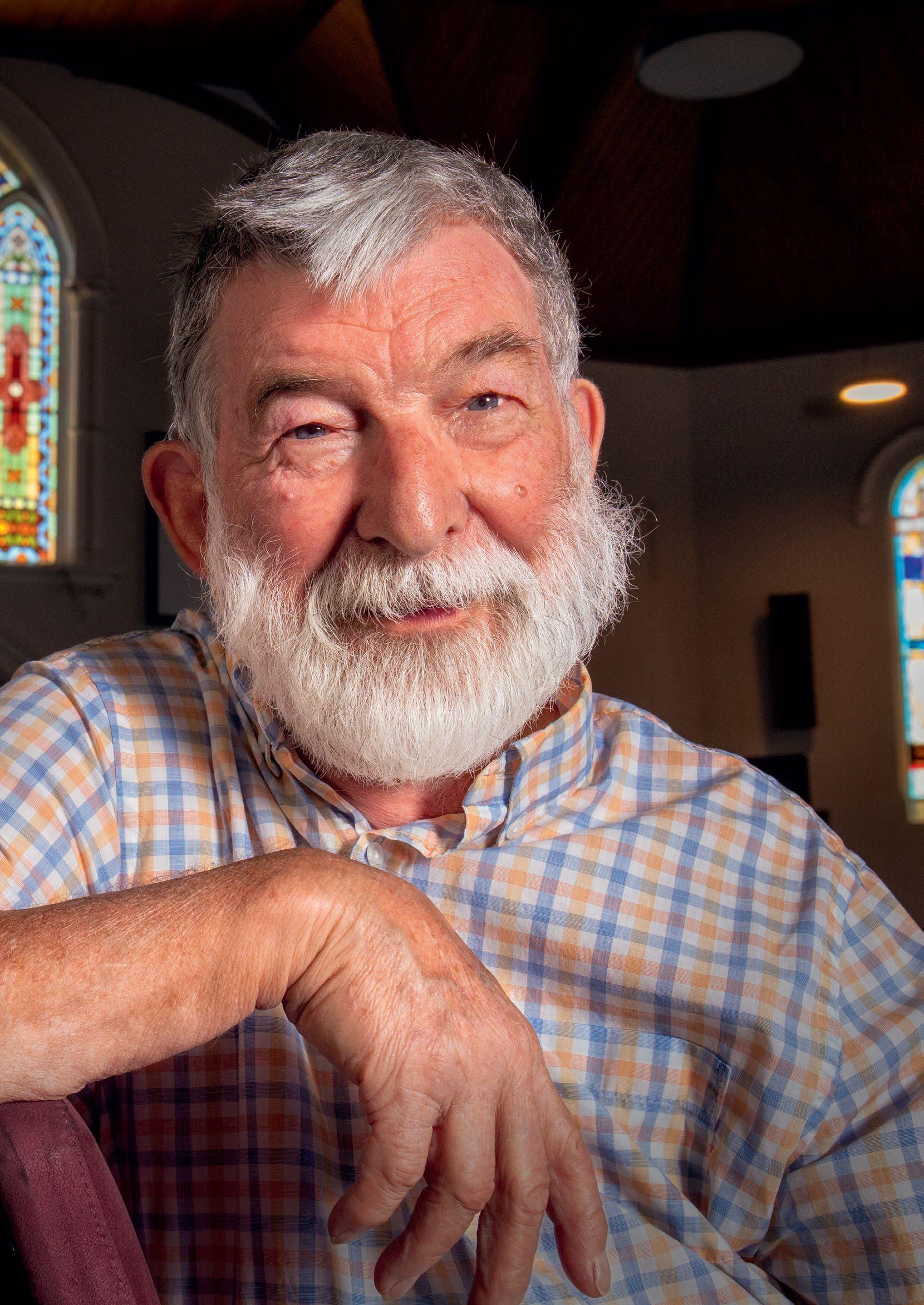 Richard Allen and his fellow Queenscliff-Point Lonsdale congregation members are driving positive environmental change.
Image: Carl Rainer
Richard Allen and his fellow Queenscliff-Point Lonsdale congregation members are driving positive environmental change.
Image: Carl Rainer
“The National Assembly’s pledge around net zero emissions wasn’t the initial driver for us, because we have been embracing moves towards renewable energy sources for a few years before that,” Richard says.
“Having said that, we’re aware of the Assembly’s pledge, we totally support it and feel totally supported in our own efforts.”
At a presbytery level, Richard has regular conversations with the Port Phillip West climate action group and has been invited to join its committee, a perfect opportunity to continue promoting educational efforts around the threat posed by climate change.
“I’m an optimistic person by nature and I think we can do something better or we’re all going to bear the consequences of climate change,” he says.
“We as a church community are determined to play our part in fighting global warming and climate change with all the means that we are able.”
Doing something better on the renewables front has become something of a mantra for the congregation, from embracing the use of solar panels to making a move away from gas.
The Queenscliff-Point Lonsdale congregation’s renewable energy program has been made possible thanks to a number of grants.
Projects completed or under way include:
Installation of a solar battery in Queenscliff church hall, funded by a Powering Communities grant.
Electric ovens replacing gas in Queenscliff kitchen, funded by Geelong Community Foundation grant.
Electrical ducted heating in Bay Room, Queenscliff, funded by
Among the projects completed by the congregation are the installation of a solar battery in the Queenscliff church hall, electric ovens replacing gas in the Queenscliff kitchen, and electrical ducted heating replacing gas in Queenscliff’s Bay Room.
It’s a small snapshot of what individual congregations with the right attitude can achieve.
“We want to encourage other congregations to do whatever they can to fight climate change,” Richard says.
“This action can range from very small steps to quite significant ones, so things like moving away from the use of fossil fuels to embracing the benefits of recycling, and looking after the planet better in other ways.”
Richard says one of the easiest ways to take up the fight against climate change at a congregational level is to take advantage of the many grants and subsidies available to begin the process of reducing the carbon footprint.
In the Queenscliff-Point Lonsdale congregation’s case, grants have been made available from a number of organisations, ranging from Powering Communities to the Geelong Community Foundation.
Community Climate Change and Energy Action grant from Sustainability Victoria.
Hot water service to kitchens and toilets at Queenscliff, partially funded by Presbytery of Port Phillip West Simpson Fund.
Congregations should approach their respective local government organisation to find out what grants might be available.
Grants are also available from respective state and federal governments, and those websites listed below are a useful starting point for congregations (the shorter URLs are for each home page, with easy-to-follow links to access funding information on that page):
Grants are also available through government at a local, state and federal level.
“From our point of view we would be able to do very little without access to grants,” Richard says.
“We’re a congregation without access to any significant bequests, or properties or dwellings we could lease out to raise money, so grants are an important part of our fundraising.”
Richard says as long as a congregation has one or two members prepared to spend the time exploring grants, they have potential access to a rich vein of funding to tackle climate change by embracing renewable energy. It’s a process that must, says Richard, begin with a small step, but it’s that initial step that can propel a congregation towards achieving wonderful things.
“You’re not going to get anywhere on the journey towards mitigating the impacts of climate change until you take that first step,” he says.
“One of the things we achieved last year was to turn off gas at our Point Lonsdale Kirk’s Place building, so now everything is electrically powered, and that’s a small step making a big difference."
Victorian Government www.sustainability.vic.gov.au www.frrr.org.au https://www.solar.vic.gov.au
Tasmanian Government
www.stategrowth.tas.gov.au/grants_ and_funding_opportunities www.health.tas.gov.au/about/ what-we-do/strategic-programs-andinitiatives/healthy-tasmania-strategicplan/healthy-focus-grants www.recfit.tas.gov.au/household_ energy/energy_saver_loan_scheme
Federal Government
www.energy.gov.au/business/grantsand-funding www.communitygrants.gov.au/grants

‘Mine Is The Kingdom: The Rise and Fall of Brian Houston and Hillsong Church’
Review by Damien
Tann Author: David HardakerPrice: $25
Stars: 5/5
The story of Pentecostalism in Australia began well before Brian and Bobbie Houston arrived in Sydney from New Zealand, and it will continue long after.
The many local churches who have served God and their communities across The Great South Land of The Holy Spirit have been influential, for good and less so, for more than a century.
David Hardaker’s book looks at this broader picture, as well as the specific story of Frank Houston’s Sydney Christian Life Centre and the multicampus megachurch and multi-milliondollar businesses born from it in the last half century.
I was a participant in Hillsong Church London, and a member and leader of various foyer-based teams for church and conferences, from 2003-2009.
Much of what is described in this book I did not see: the downfall of this ministry occurred in Australia and New York, and in the 2010s and 2020s.
The culture of Hillsong has had an effect on my faith and my ministry, mostly for good, yet I was able to relate especially to the criticisms levelled at Pentecostalism (and Brian Houston himself) when it came to the sets of influence around Scott Morrison, his life and work, and his attitudes and actions while a cabinet minister and then Prime Minister.
As the survivor of a childhood sexual assault, the stories of those who suffered
at Frank’s hands, and Brian’s silence, also resonated with me.
As an observer of Hillsong Church, albeit more than a decade ago, I found the book to be balanced, with positive and negative stories about the church I see, the Houston family (one of whom I met and drank beers with on occasion), their friends and colleagues, and the wider Pentecostal movement in Australia and New Zealand.
This is a well-paced read, interesting and informative, written by a Walkley Award-winning journalist and long-time observer of Hillsong.
Pastor Damien Tann is minister at St Matthew's Stawell Uniting Church and Pomonal Community Uniting Church

Crosslight is a bi-monthly magazine produced by the Communications unit of the Uniting Church in Australia Synod of Victoria and Tasmania. Opinions expressed in Crosslight do not necessarily reflect those of the editor or the policies of the Uniting Church.
While Crosslight endeavours to publish all articles in a timely manner, they may be held over occasionally for a variety of reasons. In that event, any article will be included in the following edition of the magazine.
Advertising
Crosslight accepts advertising in good faith. Acceptance of advertising does not imply endorsement. Advertising material is at the discretion of the publisher.
Advertising deadlines for August, 2024 Issue:
Bookings
June 20, 2023
Copy & images for production
June 27, 2024
Print ready supplied PDF
July 11, 2024
See crosslight.org.au for full details.
Distribution
Crosslight is usually distributed the first Sunday of the month.
Circulation: 13,000
Editor
Andrew Humphries
Ph: 0439 110 251 andrew.humphries@victas.uca.org.au
Graphic design, photography and print services
Carl Rainer
Ph: 03 9340 8826 carl.rainer@victas.uca.org.au
Advertising and distribution
Dominic Kouts
Ph: 03 9340 8846 dominic.kouts@victas.uca.org.au
UCA Synod office
130 Lonsdale St Melbourne Victoria 3000
Feedback & correspondence crosslight@victas.uca.org.au
ISSN 1037 826X
Next issue: August 2024
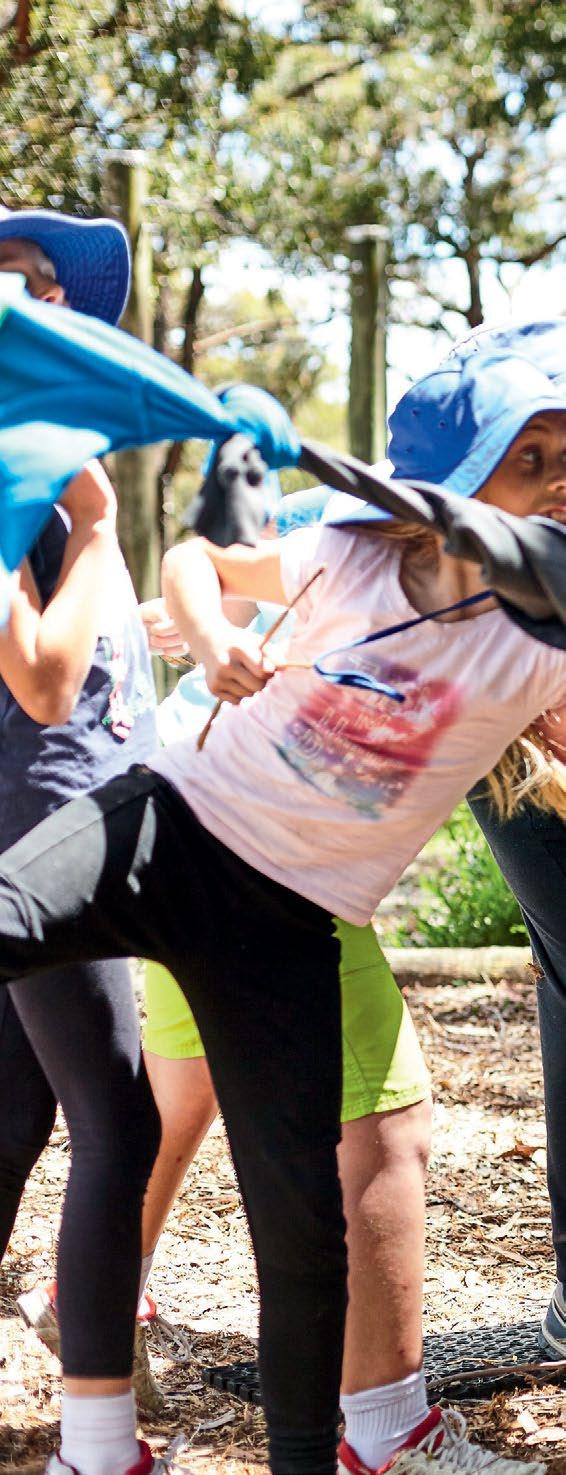
When the Synod of Victoria and Tasmania made the difficult decision last year to sell its camping sites, it signalled the end of an era for many Uniting Church members.
For so many people, UC camping brought back a host of fond memories.
Gippsland minister Rev Jennie Gordon can recall wonderful times spent camping during her formative years within the Church.
For Jennie, and other Uniting Church members of her generation, lifelong friendships and faith journeys were cemented while camping.
It’s why last year’s closure decision resonated so strongly with Jennie, and many of her contemporaries.
“Camping was formative in my youth, as it was for many of my generation in the Church,” Jennie says.
Last year’s closure decision came
after a great deal of careful thought, says equipping Leadership for Mission Executive Officer Duncan Macleod.
“The last four years have been challenging, particularly with the impact of COVID-19 on bookings and financial sustainability,” he says.
While there had been a recovery in terms of bookings following COVID-19, Duncan says the need for significant investment in facilities had led to a review of the future of UC Camping.
“The Synod Standing Committee decided in June 2023 to divest the UC Camping business by the end of 2023, and to use sales proceeds to invest in a new vision for camping ministry,” he says. “The five sites in question were Norval and Camp Acacia in Halls Gap, Adekate Lodge near Creswick, Grantville Lodge, and Merricks Lodge on the Mornington Peninsula.
“The Lake Tyers Camp Site, run by Gippsland Presbytery, was not part of the review.”
Duncan acknowledges the closure marks the end of a significant chapter.
He says the five sites have been sold, with many staff members taking up roles under new ownership.
“Sale proceeds are likely to be distributed in two ways: contributions to the Presbyteries that have financial stakes in UC Camping sites, and investment in an ongoing vision for camping and other temporary community opportunities in the Synod of Victoria and Tasmania,” Duncan says.
“The Synod’s Ministry and Mission Committee has been tasked with facilitating a conversation about ways in which the Synod continues to foster and sponsor the various forms of ministry relating to temporary community,

including camping, retreats, pilgrimages of various sorts, and walking on country.”
Duncan says the camping sites were an important part of Uniting Church life in regional areas.
“These camp sites have been associated with significant ministries with young people, children, and families, as well as providing connections with schools and community groups,” he said.
“The Synod is grateful for the significant leadership of UC Camping Directors Andrew McGuckian, over 19 years, and Daniel Murray, over the last five years.
“Oversight has been provided by the UC Camping Committee, initially accountable to the Synod through the Commission for Mission, and Presbyterybased camping committees.
“David Parker, Denis Hawkey and
Tim Angus have faithfully chaired the UC Camping Committee, and we have been well served by managers Matt and Belinda Quick at Grantville, Matt Gee at Merricks, and Grant Keilar at Norval Lodge and Camp Acacia.
“Interest from property sales proceeds will start to be available to the Church in 2025, and eLM will continue to provide support for the revisioning and resourcing of the Uniting Church’s ongoing camping ministry.”
Jennie Gordon says the camps’ closure deserves to be recognised as the end of a wonderful era for so many Uniting Church members.
“Growth of faith and deep friendships happen through camping and they are life-changing and life-long,” she says.
“We discover that there is more in us than we think, we find new ways of being in the world and with each other.
“I'm grateful for the campsites that have belonged to the Church and how they became familiar, recreational, restorative and safe places for us.
“I'm grateful for the people who were there alongside us, encouraging us in life and faith.”
Moyston farmer David Coad recalls wonderful hospitality offered at Norval campsite near Halls Gap during what was a difficult time for many farmers.
“Probably my most enduring memory of Norval is the utter incredulity of members of the farming community, during the millennium drought, who were offered, at no cost, the take a break camps,” he recalls.
“The offering of some respite from an extremely challenging situation allowed the families a break and the forming of friendships and support groups as part of that process. “I suspect that the
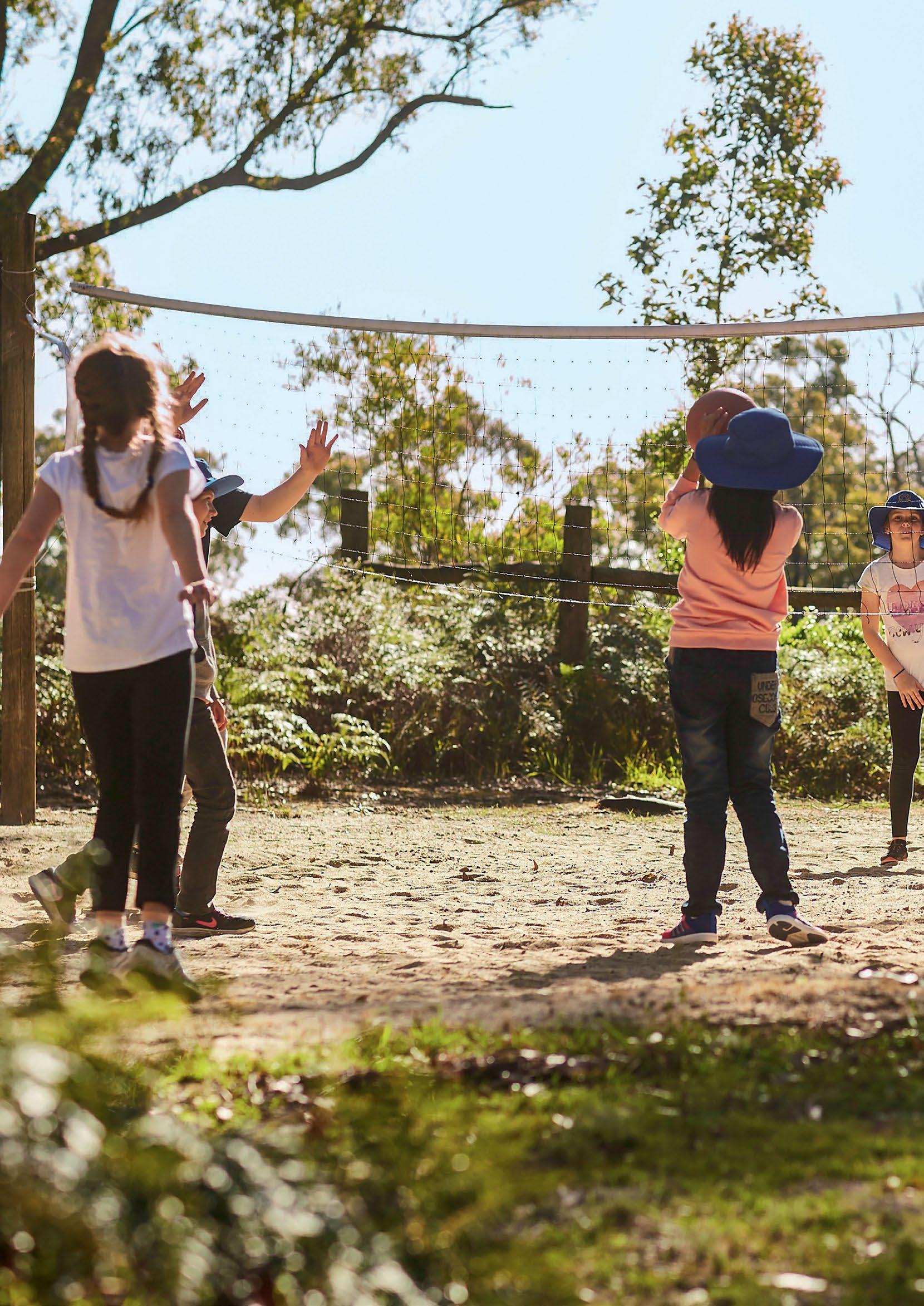
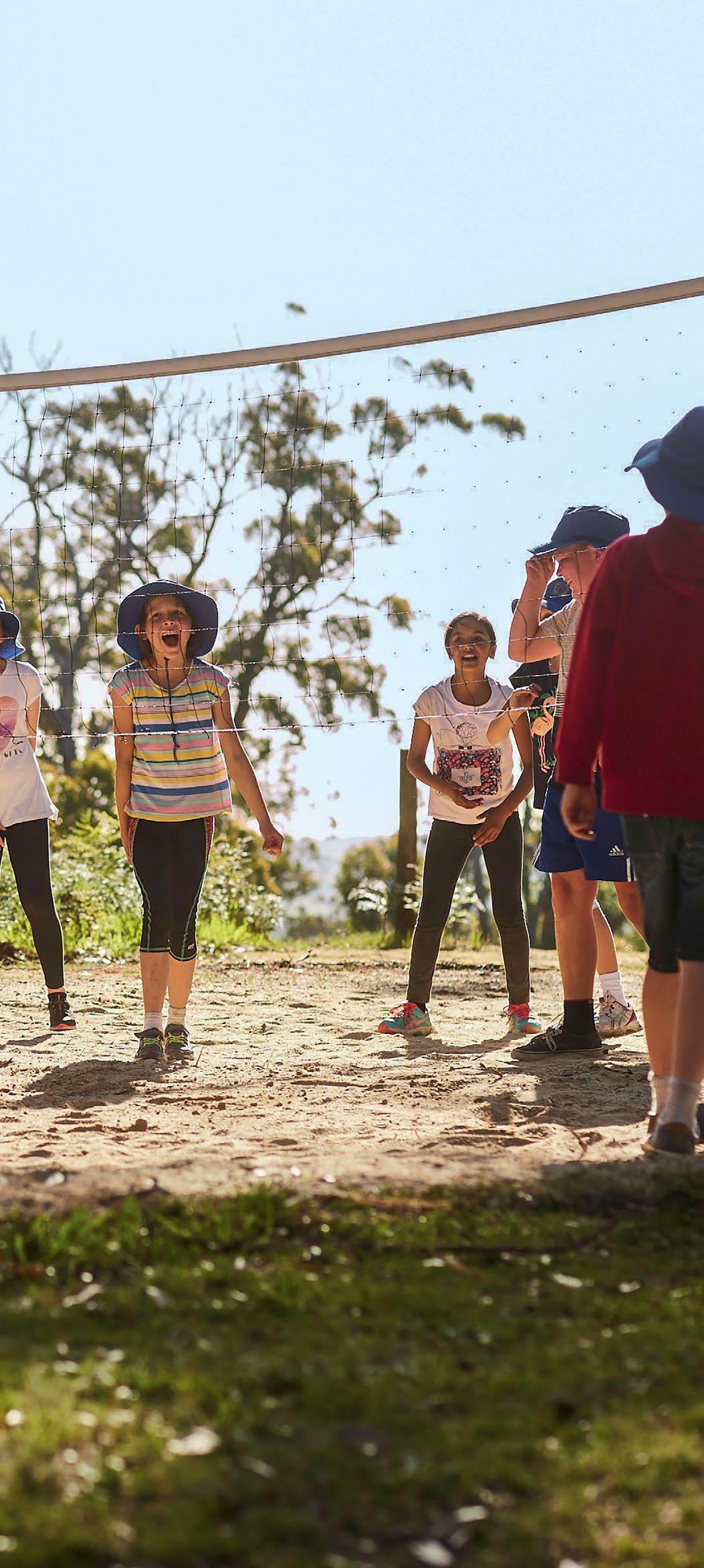
From P37
breathing space many received had a much bigger impact than just a few days away.”
Late last year in the chapel at Grantville, UC Camping Committee Chair Rev Tim Angus offered a simple prayer marking the end of UC Camping, and what it had meant in the life of the Uniting Church.
“We give you thanks for the many expressions of community life that have been lived out at campsites across the Synod of Victoria and Tasmania,” Tim said.
“(Thanks also) for those who made a commitment to the way of Christ through camping, and to the discipleship of community and justice-making and care of creation.
"I'm grateful for the campsites that have belonged to the Church and how they became familiar, recreational, restorative and safe places for us."
Gippsland minister Rev Jennie Gordon
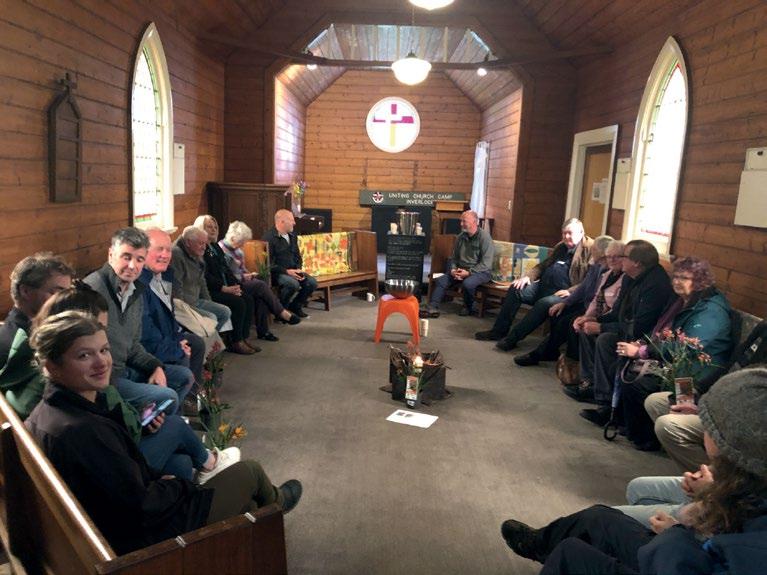
“We give you thanks for times of relaxation, prayer and communal life that have sustained the life of those living out their faith in their places of work, in their local neighbourhoods, and in positions of leadership in the Church and the world.
“We give you thanks for those who have managed the campsite on behalf of the Church, the staff of Uniting Camping, and those who went before them, for their hospitality, for the ways they ‘got’ the mission of the Church, for their generosity and sacrifice during the COVID years, and for the entrepreneurial skills, wise leadership and integrity of those who saw the vision for Uniting Camping and gave it direction.
“We pray that the sites might continue to be made available to those who otherwise might not have access to places of hospitality and welcome, rest and rejuvenation.”
